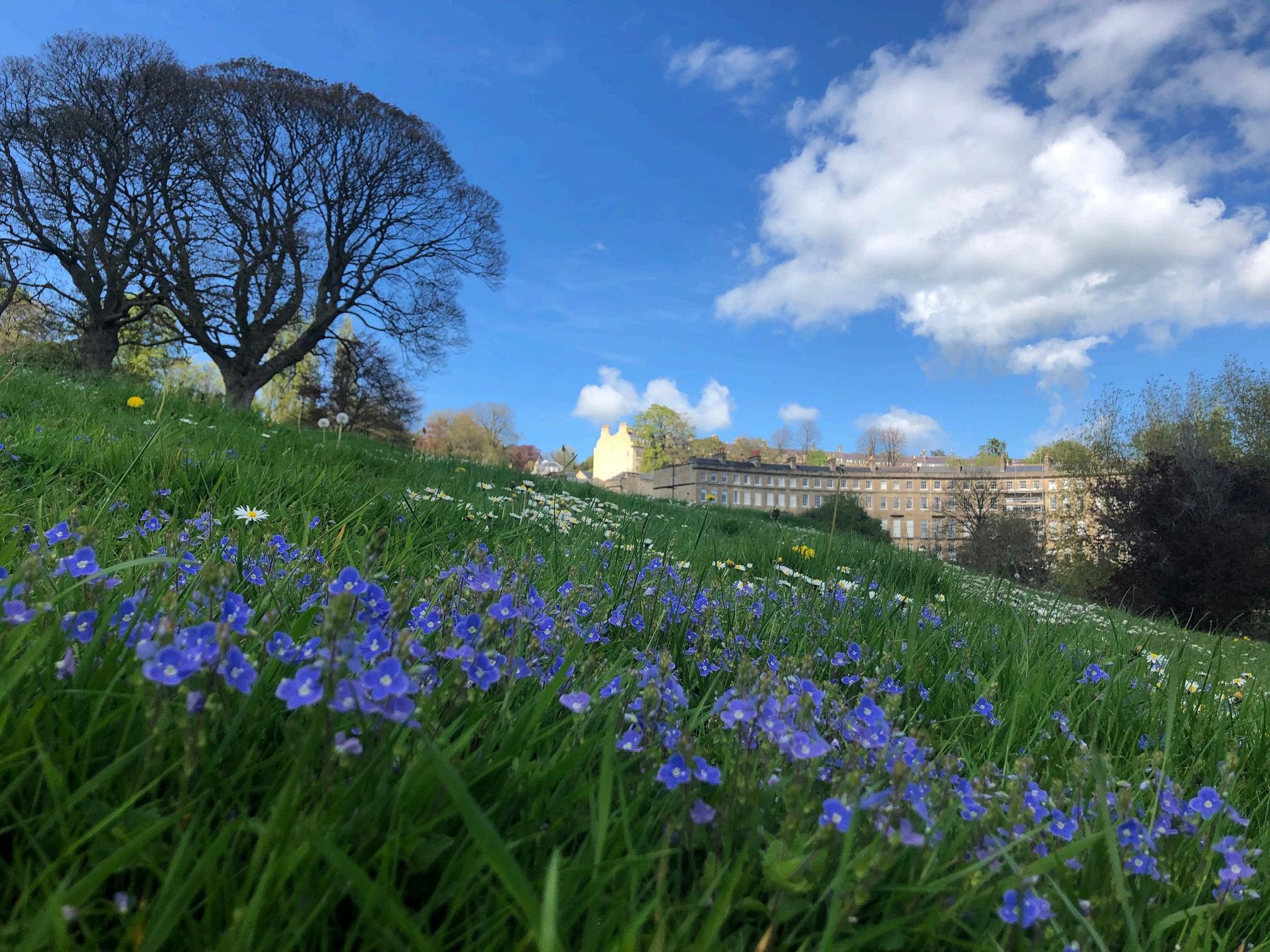






 Editor-in-Chief Features & Investigations
Editor-in-Chief Features & Investigations
Dear Reader,

Deputy Editor
Lifestyle
The Splash!
LOUISE SADLER ELLIOT ROSE Deputy EditoThe time has come to bid you farewell...
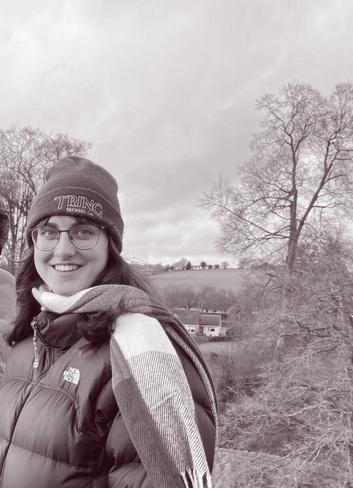 Comment & Conversation
Sports & Activ
Comment & Conversation
Sports & Activ

Bath Time has indeed had an action-packed journey this year. So much so, you would assume that we have more than three pairs of hands for all that content creation! We don’t know what this ‘studying thing is that you all do! This year has been a huge collective effort to develop new projects, improve our quality and get more of you involved. Despite the challenges, many Magic Stars and coffees later we are so happy to look back on the time we have spent getting to know you and leaving a legacy behind for future Bath Timers to draw inspiration from - we look forward to seeing our little publication grow!
This leaves us with our final print edition. Covering 60 pages, 22 articles (and poetry!), we sweep from mental health to Neanderthals, running the Bath Half to Doctor Who.
We represent the student voice: a diverse collection of individuals, reflecting a diverse range of student interests, shining a spotlight on the inner beauty of the student body.
Thank you for reading our content and writing for our magazine, Your Bath Time Committee x
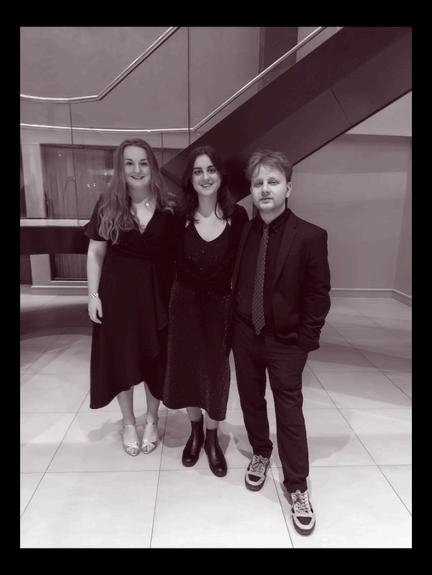
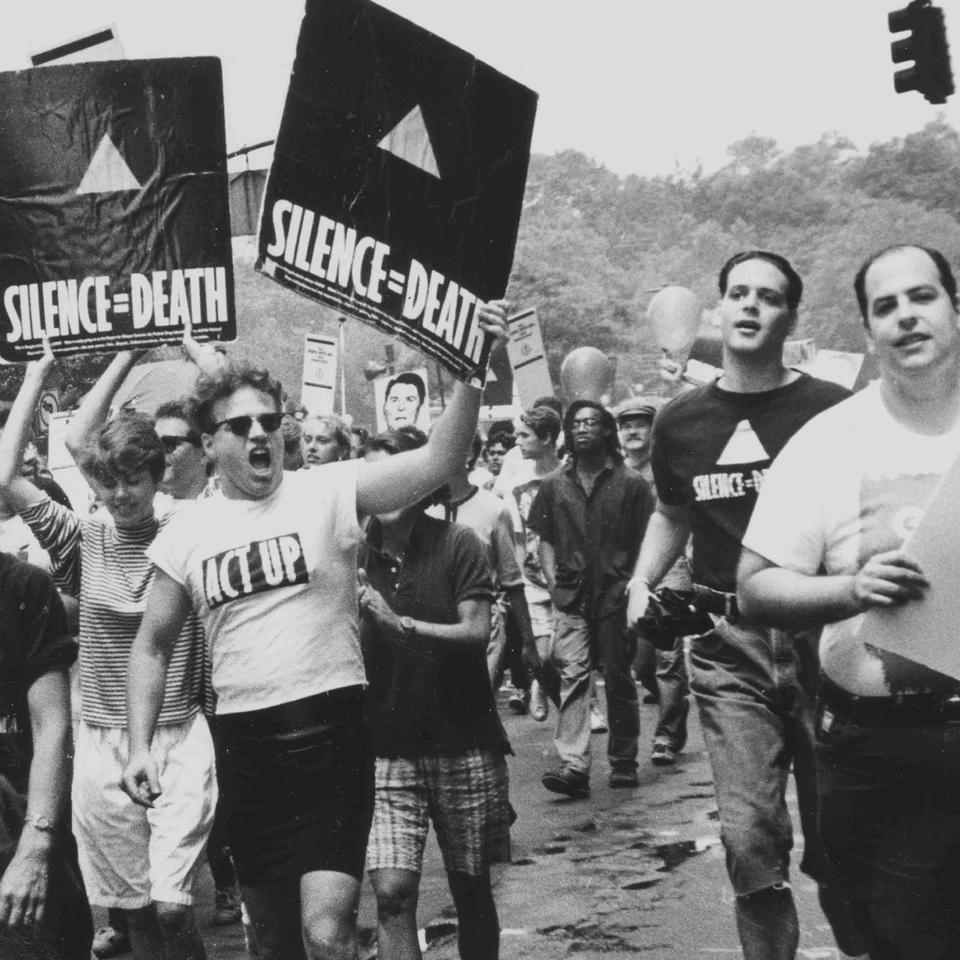
EDITED BY NAOMI
NELSONThis year, Student Minds Bath have reached out to students about what has helped protect their mental health while juggling the responsibilities of university life. We hope that hearing others’ experiences can be valuable to student readers, both in demonstrating that finding things overwhelming is common, as well as providing examples of things you can do to support yourself. We are so grateful to everyone who contributed and hope you enjoy hearing from students as much as we have.
We found that many students emphasised the value of different societies and activities for their wellbeing. This ranged from sports to creative pursuits to volunteering and affirmed the value of extracurriculars to provide a sense of community and identity outside of academic courses. Students also discussed self-compassion and mindfulness techniques, which are becoming increasingly more discussed in the media and feature in undergraduate modules on psychological wellbeing at Bath and Yale University.
We recognise that these submissions discuss positive experiences despite the reality of at least 16% of students struggling with serious mental health difficulties. We are aware that national and university services have a way to go, but we hope that the article can be a supportive tool despite this
Being the project leader of VAware, one of the amazing VTeam volunteering groups has boosted my wellbeing in various forms Volunteering is a great opportunity to meet new people and continually challenge yourself, but most importantly, support your community by promoting a safe and welcoming environment that everyone can consider ‘Home’ Leading projects for VAware has enabled me to disconnect from the hectic university life and assessments, delivering awareness workshops on healthy relationships, and helping to break the cycle of abuse one project at a time The role has also encouraged my creativity, a quality that I consider limited nowadays from social media, by organising interactive projects on campus This included making roses from paper on Valentine’s Day to promote healthy relationships and raise donations for FearFree, a charity offering support to victims of domestic abuse and sexual violence I thrive within a voluntary environment I love to see the joy it brings to others, with everyone dedicating their energy to a collective good cause, helping bring the community together. For this reason, I encourage all Bath students to nominate themselves for next year ’ s VTeam Project Leaders, committee members and volunteering positions. - Sophia
I was the fresher who fell into the trap of heavily comparing myself to flatmates and coursemates and believing that because I didn’t find my people on the first night (and even the first semester!), I had failed at uni My mental health hit lower than low, but through persistence, positivity, and a lot of self-development, I’m finally becoming my most confident self yet For me, a major help has been downloading positive affirmation apps, actively finding gratitude or a silver lining in absolutely everything (I promise it’s possible) and acting positively towards myself and others Some of it seemed a bit unbelievable at first, but I stuck with it and added both gratitude and positivity into my everyday routine I now find it so easy to see the good in things even if it’s not an ideal situation. Affirmations might seem cringe or silly initially, but really stick with them as I did and I can almost guarantee you’ll elevate your uni experience in the gorgeous city of Bath, and even more, your self-appreciation. - Olivia
Since being at uni, one of the greatest supports to my mental well-being has been getting creative I love writing and for the past two years, I have led a small writing group for National Poetry Writing Month. This has been incredibly encouraging, as we have shared things we care about and got closer as a whole. I find people often turn to creativity because they want to be heard and seen. It’s been super exciting to see the spoken word, comedy and grassroots theatre scene blossom in Bath and Bristol, making it the perfect time to get involved! There are also opportunities on campus for a wide array of creative pursuits, with SU-run workshops, Fine Art, Photography, Literature, dance and many more societies (I’ll also include STEM societies for unconventional creativity) and opportunities to pitch and perform student-run shows with BUST and BUSMS. - Elena
I chose to give myself a goal when I first joined uni as a promise to myself that I would stay active and go outside every day for at least an hour That goal was to run a 155km ultramarathon in February 2024 This allowed me to join the Bath Endurance Society and make new connections, as well as a sense of purpose and community I used this run to fundraise for the mental health charity MIND, which has since raised over £13600 By picking a goal for myself, I was able to put myself out there and keep myself busy I feel like this could be applied to many people for whatever activity interests them. Sport is such a key part of wellbeing, and we are lucky to have such good facilities in Bath. So, whether it’s a hot girl walk with your friends once a week or playing for a first team, exercise is an easy way to get out of your room and generate endorphins whilst socialising with others, and hey, it could have the bonus of helping raise money for charity. - Maia
After moving to Bath as an international student, the community that I have found here is definitely the most important factor that has helped my mental well-being. From the pastoral care provided by the Imam (Muslim community and faith leader) at Bath Mosque to the Bath University Islamic Society and my friend group, my wellbeing is always prioritised and well-supported. Some other important factors that help my mental wellbeing are the various mental health support facilities provided by the university like the Roper’s Centre, Wellbeing Support Services and Nightline. I also go for frequent walks in the green areas surrounding campus and discuss things that may be bothering me with a friend. Overall, the community, my friend circle and the mental health support that I have in Bath not only help support my mental wellbeing but also make the university experience more fun and meaningful. - Jibraan
Growing up, I’d heard about meditation and its benefits but always had my reservations When considering the sheer number of meditation practices, it was hard not to feel overwhelmed with where to begin That’s when I heard about the university’s meditation society At the time I was a first-year student naive to the pressures of university life Ultimately those pressures caught up to me With multiple deadlines closing in, I was at my wits end on how to deal with all the stress. That’s when I bit the bullet and finally decided to give Meditation Society a go. What I ended up finding was beautiful: I found a place to deal with real-life problems, a place to belong. I found a community. This society is very welcoming to beginner meditators with no experience - so for those of you who may be struggling, why not try meditation society? Who knows, you might just make a friend along the way. - Praveen
For many of us, moving to university is the first time we must support ourselves, independent of a carer or guardian As I began this period of new responsibilities, I found that self-compassion became more vital for supporting my wellbeing than ever before Characteristic to many other university students, I tend towards perfectionism and high standards: a sometimes dangerous recipe for burnout With new domestic responsibilities, I noticed I was becoming increasingly tired and no longer able to maintain the same amount of productivity as at home I found it helpful to practise self-compassion I am trying to accept my increased need for rest days and treats, as it is often too easy to be self-critical of ourselves for not completing to-do lists I have found it is fundamentally important for supporting my well-being that I show the same kindness to myself as I would do to others -
MiaWanna read more? You can find all of the student perspectives from this project on the Bath Time website!
If you are struggling with your mental health, please reach out to: Emergency -The Samaritans 116 123 SHOUT 24/7 text-based volunteer crisis support line - text 85258 General- Student Support: studentsupport@bath.ac.uk, +44 (0)1225 383838. Based in the Roper Centre.
When I look back on the moments that brought me here as an editor of a student magazine, I can think of past moments in history in which this would not have been possible, resembling figments of a future life. After my parent’s divorce, my mother solely supported my brother and me through secondary school; without the invention of child benefits and laws against child labour in this country, I likely would have left education far earlier than intended. If it wasn’t for the implementation of student loans in 1990, there would have been no likely way I could have partaken in higher education; I am the first member of my family to go to university. As time advanced, the traffic lights of progress halting the march of many students went from red to green. In the UK, we live within the luxury that regardless of one ’ s identity, the notion of going to university is not just assailable but an expectation. Of course, there is still advancement to be made in this regard, but it is fair to say that large proportions of students in the UK would have likely not made it in years gone by.
As I embarked on my university chapter (one I am coincidentally about to end), I was fortunate enough to qualify for the Bath Bursary; a scheme that provides many students, from a parental income of £25,000 or below annually, more than £3,000 every year to support themselves To say that this scheme merely ‘supported’ my studies here would be an understatement It significantly diminished my mother’s need to support me financially with my brother still to take care of. It allowed me to leave a job in my
first year, working in a supermarket with a toxic working environment in which I was being exploited the bursary meant I could get by without the additional funds During my placement year, these funds allowed me to take an unpaid placement in a field that I was both interested and passionate about, an experience I thoroughly enjoyed that inspired my present master’s degree, but again, it would not have been possible otherwise. In my final undergraduate year, I became seriously involved with Bath Time, despite navigating a treacherous and timeconsuming academic year. Without the bursary, I would have likely needed a parttime job and therefore not be able to commit to this magazine. Perhaps I would have become far less likely to have the journalistic aspirations I have currently, about to embark on a journey into the world of professional journalism.
On reflection, the Bath Bursary is a fundamental part of my DNA, piecing me together as an individual leaving university with the same confidence and ambition as those without the same socioeconomic disadvantages Yet alongside being a bedrock for students to rely on as well as postgraduate programs and the Gold Scholarship, it is also a sanctity easily shaken with potentially devastating consequences. It is for this reason that the significant modifications to these programs, as a result of the new Access and Participation Plan, have invoked resentment from several SU Diversity Groups, and have brought the university's devotion towards accessibility under debate.
What are the changes? *
*These changes will only affect joining students rather than current ones. If you are presently a student at the university, your funding will not change.
The period of 2024/2028 will see all schemes widen accessibility to students of a parental annual income of up to £30,000, up from £25,000. As well, there will be a removal of some of the widening participation criteria.
For the last few years, recipients of the Bath Bursary have received £3,000 in cash each year of their studies, as well as a £2,000 supplement whilst on an unpaid placement and a £750 university accommodation reduction
From the years 2024/28, joining students will receive £2,000 in their first year, made up of £1,000 cash, £1,000 on-campus food and drink credit, plus £750 university accommodation reduction. The unpaid placement bursary will remain the same.
From 2021 onwards, recipients of the Gold Scholarship Program received £5,000 in cash for each year of their studies, as well as the same placement and accommodation
reduction supplements as the Bath Bursary
The years 2024/28 will see first-year students receive £3,250 cash and £1,000 food and drink credit, in addition to the accommodation reduction Continuing students will receive £4,000 cash and £1,000 eat and drink credit.
Last year, a limited number of postgraduate students could access bursaries of either £5,000 or £10,000 as part of the Postgraduate Master’s Bursary.
For next year, the Postgraduate Master’s Bursary will be disbanded. It will be replaced by the Global Leader’s Scholarship, which will see a limited number of 45x £5,000 scholarships handed out to students.
It should be mentioned that many postgraduate students elect to fund their studies through other various scholarships not affiliated with the university itself.
*All this information is from the Access and Participation Plan 2020-2025, and the Access and Participation Plan 2024-2028.
According to the most recent Access and Participation Plan, “the intention behind these programs is to:
Provide support to the students with the greatest additional need so they can fully take part in life at university.”
Provide targeted financial support to students experiencing specific financial burdens.”
Provide students on these programmes additional support and opportunities to build their skills and expertise.”
The plan also cited ‘’internal evidence’’ that Gold Scholarship Programme recipients are more likely to say that “they have been able to cope financially and cover the course, basic food and rent costs ” It also remarked that Bath Bursary students are “ more likely to report that they can participate in wider university activities, cover course costs, and borrow less”, in comparison to non-bursary students.
As part of my investigation, I asked a handful of anonymous recipients of these programs what they thought of the changes. I emphasised how these changes might have altered their university experiences. The responses were stark. One respondent remarked that “they already have two jobs as a bursary holder”, and that any changes would likely “lead them to take more shifts and miss more teaching hours.”
“Food credit means nothing to someone who’s struggling to pay their rent.”
In each response, a general theme was that these changes would likely make their life a lot harder One respondent mentioned that the changes towards food and drink credit from cash would strip away the independence of students Furthermore, they said the changes would constitute a significant change in their lifestyle at the university, as presently most of their meals are “homecooked” and they only visit campus “three days a week” They suggest that this is a “step backwards” for students who enjoy cooking their meals and that they could make meals more costeffectively than the university.
“Part of coming to university involves learning how to manage your money and make the best choices for yourself, and I don’t believe this should be taken away from the lowest income students.”
Another respondent notes how these changes are perhaps inconsiderate of students traversing university in less conventional ways They opted against taking out a maintenance loan to “avoid having more debt at the end of university ” Therefore, the freedom to spend cash how they need is instrumental; they mention that the bursary “helps pay my rent considerably’”, and that £1000 would be “close to nothing with the current rent prices.” Like other respondents, they mention how these changes are likely to force them to work more and cause their academic performance to falter. In addition, travelling so often to campus to exercise their food and drink credit may be undermined by expensive bus passes, and similarly, they see the food as being overpriced.
“In conclusion, no, I do not believe I will be able to live off next year ’ s bursary.”
To find out why the university has decided to go in this direction, I spoke to two key figures with a leading role in the direction of the university’s accessibility programs: Andrew Ross, Head of Access and Participation at the university, as well as Bethany Howson, the Head of Philanthropy
Andrew remarked that the key to these changes was the widening participation of students in these schemes
As previously mentioned in this article, students with a parental income of up to £30,000 now qualify, up from £25,000. He said that this was due to “ wage inflation”, which meant that “fewer households were falling into the income bracket”. Andrew noted that this change would likely see the number of students qualifying for the bursary increase “according to our modelling”, but was unable to provide precise figures until the start of the next academic year.

An influx of students qualifying for these programs, whilst retaining the same funding for students would have left a funding gap Therefore, a reduction in what students received allowed the financial support package to be “affordable” for the university - the money has to go further This was also amidst a capping of home tuition fees during rising inflation, leading to “ a period in which tuition fees are reducing in realtime”, resulting in the university receiving less money.
Andrew suggests spending on financial support “will be higher” next year than this year. Indeed, spending is projected to increase from £4.5 million this year to £4.9 million according to financial statements available in the Access and Participation Plans. This will, however, drop to £4.2 million by 2027, when most students on the present bursary and scholarship terms will have graduated. Once most recipients are on next year ’ s terms, there will be a drop in financial support funding from the University.
On the utilisation of on-campus eat and drink credit, He says this is the only way in which the university can provide additional support to students, providing “ more ” by spending less. Regarding the £1.50 cost of living meals, the University is yet to provide any information regarding the margins on these, as well as other food and drink available on the credit An unnamed SU source suggested that the new credit will be “scandalous” if it is found that there is a significant margin on these products, meaning that they would be profiting from our most socioeconomically disadvantaged students As of yet, the university has not released any information on these margins
Andrew also referred me to the progress the university has made with “the introduction of £1.50 meals on campus ” , “ a doubling of the hardship fund”, and the “introduction of the community fridge” on campus, undeniably schemes that have had a positive impact on students’ lives.
Andrew wished to emphasise that the level of the bursary “ compares favourably to what is offered at other universities”, and students thinking of joining “will have an informed choice” compared to other universities in which they may be holding an offer As these new rules will only affect new students, the notion is that students can decide if our university is a viable financial option before joining, or they can look elsewhere.
My conversation with Bethany Howson was mostly regarding how both the Bath Bursary and the Gold Scholarship Program are funded. Bethany told me that three-fifths of the Gold Scholarship Program is funded through donors, whilst two-fifths of the programme is funded by the university. On the other hand, the entirety of the Bath Bursary is funded by the university, however, the Advancement Office is looking at ways to integrate donor funding.
Considering the university's financial support schemes are developed on their terms, perhaps the best way to explore this question is by comparing the primary objectives of their financial support schemes with the perspectives of their present recipients.
As written above, the intention behind these schemes is to allow students to take part in university life, to provide targeted financial support to students with specific burdens, and to provide students with opportunities to build “additional skills and expertise”
I believe the testimonies above outline a viewpoint that is sceptical at the very best of our financial support programs ’ ability to achieve these aims As many of them noted, they would be forced to work far longer shifts to afford basic amenities, likely to both inhibit their university life and academic performance.
Whilst one may argue that the on-campus eat and drink credit will actively encourage these students to visit our campus, and therefore
partake in university life more often, this is perhaps undermined by the expensive price of bus fares At a minimum, it costs a student £3 20 return per day to travel to the university via bus, and £4 80 for students a bus journey away from university bus routes. If a student can cook at home for less than those prices, this makes the eat-anddrink credit obsolete.
Regarding targeting students with specific burdens, the university also hits a roadblock. Certain schemes targeting specific students like the Sanctuary Scholarship will remain the same (this is entirely donor-funded). However, one student chose to not take on a maintenance loan at the start of their studies, making the additional cash an even greater lifeline for paying fixed costs such as rent. The freedom of a pure injection of cash into one ’ s finances allows students to pay for their specific priorities, affecting recipients of these schemes with additional needs or unique financial situations. The new terms of the financial support schemes will put students in a “one-size-fits-all” policy regarding their spending, neglecting the fact that students require funding for different things.
Arguably, the greatest issue concerns students’ ability to build “additional skills and expertise” regarding the new terms One’s time at university is, for many, an opportunity to learn how to live independently; budgeting appropriately for their priorities while performing well academically As many students report, this will severely affect their financial independence Students will be forced to buy food on campus, regardless of whether they may have found a way for home cooking to be healthier or cheaper. A greater problem, however, may be regarding part-time work.
Students report that they would have to work far more often to pay for the deficit left over; living costs will remain high regardless of the university’s reduction in rent.
A recent NUS study found that over 69% of students work part-time on top of their studies, with almost a fifth of those students working over 20 hours a week Over a third of these students reported their jobs as negatively impacting their academic performance. Financial support through cash provides a lifeline for students if they choose to leave employment (as I can personally testify), whether due to being overworked, harassment, or a toxic working environment. Whilst it must be said that the hardship fund has been doubled, there is a worrying prospect that students might be financially chained to abusive and exploitative workplace environments.
One interesting aspect that Andrew mentioned to me was the ability of prospective students to make an “informed choice about the financial support available to them at Bath”, as a way of justifying the changes made. This “don’t like the financial support, then don’t go to Bath” attitude not only sets a dangerous precedent, that our university is not for the most socioeconomically disadvantaged students, but it also gaslights the concept of student financial hardship, putting the responsibility on students for choosing this University in the first place, rather than the University to provide an inclusive environment
Without the Bath Bursary, I would likely not be the Editor of Bath Time and I would likely not be writing this article I feel it is my duty, therefore, to speak up about the present brilliance of this and other financial support schemes As the student perspectives in this article show, the reduction in student funds will make living in Bath verge on being not viable for many of the present recipients. It is delusional to say that the cost-of-living crisis will magically disappear. But it’s equally delusional to say these students will not want to join our prestigious university with its brilliant graduate prospects anyway (as is their right!).
I deeply worry for next year ’ s cohort.
support, which is offered through the university’s therapeutic services and the student support advice team
At present, there is emotional aid with the intent to help students' well-being and make their time at university easier, along with practical amenities such as gender-neutral washrooms on campus While these services are an enormous, dependable source of help, they attend to one facet of a social concern that is witnessing (prejudiced) commercial consequences. Looking from the vantage point of financial backup, there is no provision of funding specific to helping TNB students, here at Bath.
On Tuesday, March 12th, the National Health Service (NHS) put forth a new policy which prohibits the use of puberty blockers as treatment for individuals under the age of 18 seeking gender transitions. This was the latest action in the UK government’s efforts to demonstrate their persistent, indifferent support for their trans and queer population.
With such an accelerating negative political campaign, further accompanied by the cost of living crisis, it has not been an easy or affordable time for trans, non-binary and queer students at university.
The policies and support that the University of Bath is bringing for its trans and nonbinary (TNB) members so far include: community networks such as Kaleidoscope, the LGBT+ Staff Network; a weekly ‘TTime’ meeting for trans students and monthly support groups such as Us@Home and LGBTQ+ Support and Socialise; resources to provide gender identity-related
I spoke to our students who are part of the community to learn more about their experiences here at the university, their responses to the university’s support, and how they would feel about such funding potentially being in place.
“Being trans comes with hidden costs. It’s almost like a secret tax.” A trans student at Bath elaborates on the administrative costs that are attached to the most fundamental steps to a trans person ’ s status, such as changing their name on their passports. Apart from the legal damage, we are all aware of the costly, but also, inaccessible healthcare.
According to NHS data, patients attending their first appointment in November 2023 are referred for an average of seven years and three months Having been on the NHS list for over two years, with three more to go, one of our trans students talks about the
weight of the UK’s prevailing political climateonhealthcareandsafety.
“We’re such a small community to have so muchfocusonandforittobesonegative,it feelsreallyhardtofeelsaferightnow.”This is true, even now, as NHS’s rules on the block of puberty blockers starting April 1st, 2024.
Prescribed for more than 40 years for safe and effective treatment, puberty blockers are reversible treatments that delay the onset of puberty and serve as an early step for gender-questioning youths. Nevertheless,asWPATHandtheEuropean Association for Transgender Health state, healthcare decisions must be driven by clinicalevidence,notpolitics
“(At university) A lot of queer people come here and it’s the first time in their life they can really start to explore their queer and trans identities.” Our first-years talk about the many firsts that come with experimentingwithgender. Makeup,bindersoranykindofitemthat
affirmyouridentityareoutthere,butoften seem unattainable to students. It’s not a great position to be in when you have to choose between investing in your expressionorgettinggroceriesfortheweek.
Hearing their thoughts on the university’s current support and resources, students praisedthecommunityfosteredoncampus, including the staff body “You come here andmeetpeoplewhoareokaytalkingabout it, especially professors who are okay quoting their research in lectures” An international student talks of the queerfriendly environment she’s found very welcoming Likewise, a student who’s used several of these campus support services also hints at his appreciation for them, however, he underlines that “the biggest thing is not that any of these services are inadequate, it’s just really hard to find them”- suggesting an easier and effective way to be able to access the resources mentionedbefore.
Students voiced their concerns that come with a trans, nonbinary or queer status. Whatisdrawnfromtheseconcernsishow

invaluable support can be So, when financial aid was brought into conservation, one of them elaborates on how funding actually comes down to the university expressing its message regarding its TNB community. “It’s just really important to make that explicit - that the support is there.” A clear message which distinguishes between being encouraging of the community, rather than sensitive to it.
Altogether, they do not doubt the university’s capabilities in bringing such change. On the prospect of the University of Bath providing financial aid specific to supporting their TNB students, one of our students positively stated that “with enough protest and with enough pushing, it can be done.”
Last term, Bath Uni LGBTQ+ society started the powerful initiative of setting up a student gender expression fund. Blake Walker, chair of the society, alongside their committee organised “DragforSwag''- a drag show event for students to display their drag talent and raise assets for this fund. The show was hosted by Bath drag royalty Remy Melee, on 25th March 2024. Witnessing it myself, the show was bursting with glam, energy & selfexpression, resonating deeply with the cause it was standing for. Towards the end, soon after the very talented Kiki Riku was announced winner, Blake shared with us some really exciting news.
They cheerfully revealed that the (first ever!) Student Gender Expression Fund has now been officially approved and endorsed by the SU and the University of Bath, to support their trans, nonbinary and queer students
When I followed up with them, Blake appreciated how valuable students' contributions have been in bringing this change, especially since this project has been entirely student-led. Blake mentioned that there were concerns due to a timely delay in waiting for approval from the university, however, they did say that the university’s efforts towards the fund & through the process felt quite genuine & encouraging.

The fund will soon be available to trans, non-binary, queer and gendernonconforming students at the University of Bath, with more information regarding the eligibility and resources on the SU’s website It has been a difficult year (or few) for the TNB community in the UK, from ever-lasting waiting lists and invalidating politics to an unreasonable cost of status. Having and knowing that support exists for our students, challenges these procedures and makes an incredible difference for them.

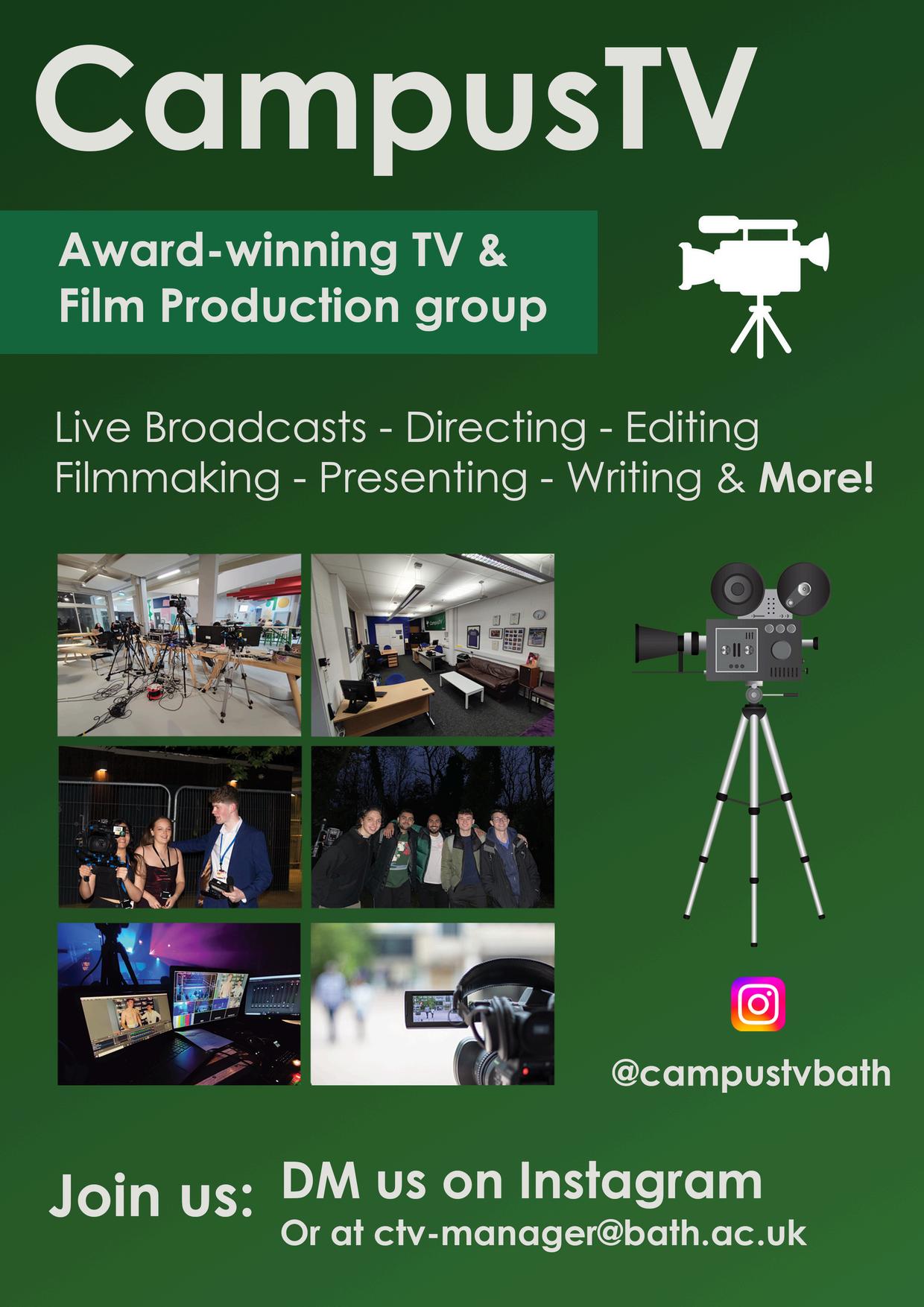
threat of climate change and now the unconscionable assault on Palestinian lives That’s excluding the unending series of Tory corruption and sleaze It’s no wonder young people are sceptical about politics and its power to create a kinder world –having never experienced this themselves Considering all this, a demoralised, exhausted youth seems inevitable.
It is not unreasonable to say that this country faces a crisis of hope. It is indeed reasonable to feel hopeless. 4.3 million children are growing up in poverty, average household energy bills have risen by 54%, rough sleeping has increased by 27% and it will take a decade to clear backlogs in the NHS and courts [1].
Meanwhile, our corrupt, inept political class do nothing That is, nothing except to sow division and fear in the absence of anything remotely hopeful As Sunak’s tenureship comes to a likely and long-awaited end, he is making a last-ditch effort to build an election campaign on culture wars, inciting fear about Muslim ‘extremists’, immigrants and the trans community: it’s all so painfully predictable [2]
For young people, this particular breed of politics is standard. After 14 years of Tory rule, it’s hard to recall a time when the country didn’t feel like it was at breaking point. Our generation has come of age in a politically volatile era, including a pandemic, two recessions, the existential
Worse, we are hurtling towards one of the most depressing, uninspiring election cycles in living memory. Where young people should be excited to vote for the first time, they are instead confronted with a bleak choice between two parties that offer more of the same. As the Labour Party shifts rightwards, it’s becoming difficult to muster up any enthusiasm for their anticipated victory, especially when their policies are so closely aligned to, and increasingly borrowed from the Tory catalogue of austerity, nationalism and general misery. Most notable, is Labour’s reported commitment to Tory tax and spending plans, a refusal to scrap the brutal two-child benefit cap and a U-turn on their £28 billion green investment plan [3]. For someone who ran his leadership campaign on social democratic, leftleaning ‘pledges’, Starmer has totally rebranded himself and appears unrecognisable He certainly has no qualms about lying, having already backslid on promises to nationalise public services, abolish tuition fees and tax the rich– and he’s not even PM yet[4]
If this appears as a harsh take, it’s supposed to be. Polls are forecasting that Starmer will become the most powerful man in the country; he, more than anyone else, deserves to be scrutinised [5]. While some have defended Starmer as the paragon of ‘ grown-up politics’, this only further proves the point.
Starmer is so desperate to appear sensible and prepared to make ‘tough choices’, that he risks committing us to a bleak future of more austerity and less meaningful change. This inaction will undoubtedly be attributed to economic instability and a need to balance the books – yet history shows us this is not an excuse.
When the country was in a socio-economic crisis after World War Two, the government saw an opportunity for transformation, not subservience; - with groundbreaking levels of post-war investment facilitating the creation of the NHS and welfare state If the post-war government had adopted this same sensible ‘ grown-up politics’ approach, we wouldn’t have these landmark policies which have improved the lives of so many What the UK needs is a hopeful, inspiring political project – one that recognises the scale of the challenges facing us and dares to tackle them head-on
It is unsurprising, then, that the collective consciousness has resigned itself to despondence. For young people especially, it feels like we are becoming increasingly out of control of the world around us. Politicians, elected to represent our interests and improve society, are making our lives profoundly worse. It is not only what young people have lived through, but what looms in their future: a housing crisis, a broken job market, and climate change. Despite this, young people’s voices are so often overlooked by politicians even though the decisions made affect us the most.

Not only are we a forgotten generation, but we are a generation who feels real betrayal. As the election rolls around, many young people will be feeling hopeless and uninspired by the choices on offer.
Despite this disillusionment, we must resist the temptation to be apathetic.
While politics may not represent us, we can create a politics that does, a politics that is ambitious, inspiring and doesn’t succumb to the status quo; young people are already driving these movements across the world Fundamental to these projects is hope: a vision for a better future Indeed, politics would be nothing without it
[1] ACTION FOR CHILDREN, 2024; HOUSE OF COMMONS LIBRARY, 2024; CRISIS, 2024; IPPR, 2023
[2] JONES, 2023; HALL, 2024
[3] JONES, 2024
[4] BARRADALE & MCRAE, 2023
[5] YOUGOV, 2024
Why is there such a disconnect between student opinion and action on climate policy? A drop-off in engagement.
Can we blame distraction? Defeat? Denial?
Although a few answers to this puzzle were thrown around during the session - namely about Green Week having been planned in hectic Week 6 - the Team blindly looked past a key issue: event awareness.
Window panels in doors are really helpful. To take a peek. To see who’s already talking. To decide whether you’ll join the discussion.
One person sat at a table in the Chancellor’s Building That was all I saw while sizing up an event on ‘What the University is doing regarding Climate Change?’ Evidently, the fleeting fever of impassioned discussion from the previous week of SU elections had already worn off
93% of Bath students say that they are worried about climate change.
This statistic from Bath Climate Action Team’s survey seemed rather hollow as I looked in on this room. The event had piqued my curiosity to see what was going to be said officially, but I was beginning to wonder if I’d be hearing the usual empty words echoing around an empty room. However, the Team’s genuine confusion and despair over the lack of turn-out was, in fact, far more eye-opening than a few staggering statistics which they had prepared about the university’s £14 million annual energy bills.
One first-year student, an active advocate for many political issues, looked at me blankly when I mentioned the flopped climate policy event, saying that they would have loved to come
The Climate Action Team assumed that students made an active decision to not get involved in Green Week events Yet, even students who would be interested in events simply often have no idea of their happening due to lack of promotion
Additionally, between being inundated with emails and the ResLife monthly calendar which appears in the kitchen sporadically only to be swamped with dirty dishes, even the more advertised events are easy to miss: it comes down to a competition for attention.
Then there’s the case of defeat. Turning up to the University’s climate workshop won’t achieve anything. What difference can one person make? Defeat that we ’ ve gone too far already. Defeat that young people have no sway in climate policy - or any policy for that matter.
One student poignantly said "There’s just other issues where I feel that my voice can make more of an impact Issues such as Palestine, which I see having a more direct and immediate human impact - discussing it actually makes a difference "
The sense of abstract defeat is also evident when talking to a student-athlete on the GB Start rowing programme, as the impacts of climate change manifest themselves daily during water training sessions: "The landing station is always covered in water. This year one of my friends hasn’t been able to row on their stretch of the river since December. But you wouldn’t know who to turn to." She says it matter-of-factly. It’s a part of training which must be dealt with, for the river can’t be controlled.
As young people, we have grown up hearing the mundane tale of climate change.
One issue in the discussion that does seem to create a more emotionally involved response among students is that of ‘greenwashing’, that is, emphasising a single environmental attribute while omitting other impacts to deceive consumers. What level of empowerment do we really have if the actions of companies mean that " even renewable alternatives are still damaging the environment?" Is it possible to be truly sustainable in the world we live in?
For students, the easier, cheaper option is often more appealing Common attitudes that "it’s too expensive to be sustainable" or "the future seems too far away " seem to be used by students to create distance from the issue Right now, the young have the want but not the means to combat climate change Recent trends in thrifting and Gen Z shoppers willing to pay an extra 10% for sustainable retail suggest there is a certain desire for some kind of change or even activism. But, to what extent? [1]
In 2021, the BBC reported that "Bath’s climate action plan is moving at a snail's pace"[2].
According to ‘Save the Student’, a studentlife hub that grew out of a demand for advice on budgeting as a university student, the University of Bath ranks 74th on an index of most sustainable universities in the UK [3]. For a city whose image relies heavily on the rolling green hills of the British countryside, it’s safe to say that our university on the pleasant pastures of Claverton is not as sustainable as it could be
Universities are places to grow thoughts for the future and inspire critiques of the present Some would say that any change happening here will not be immediately tangible and will merely be delayed for the work of future leaders But the creative and critical discussions of these future leaders in universities can have a very present impact - only if actively engaged with. For this to happen we need a change in momentum. New opinions need to be heard.
Empty rooms need to be filled.
[1] BBC NEWS, 2021
[2] FIRST INSIGHT, INC , 2023
[3] LAURA BROWN: SAVE THE STUDENT 2023

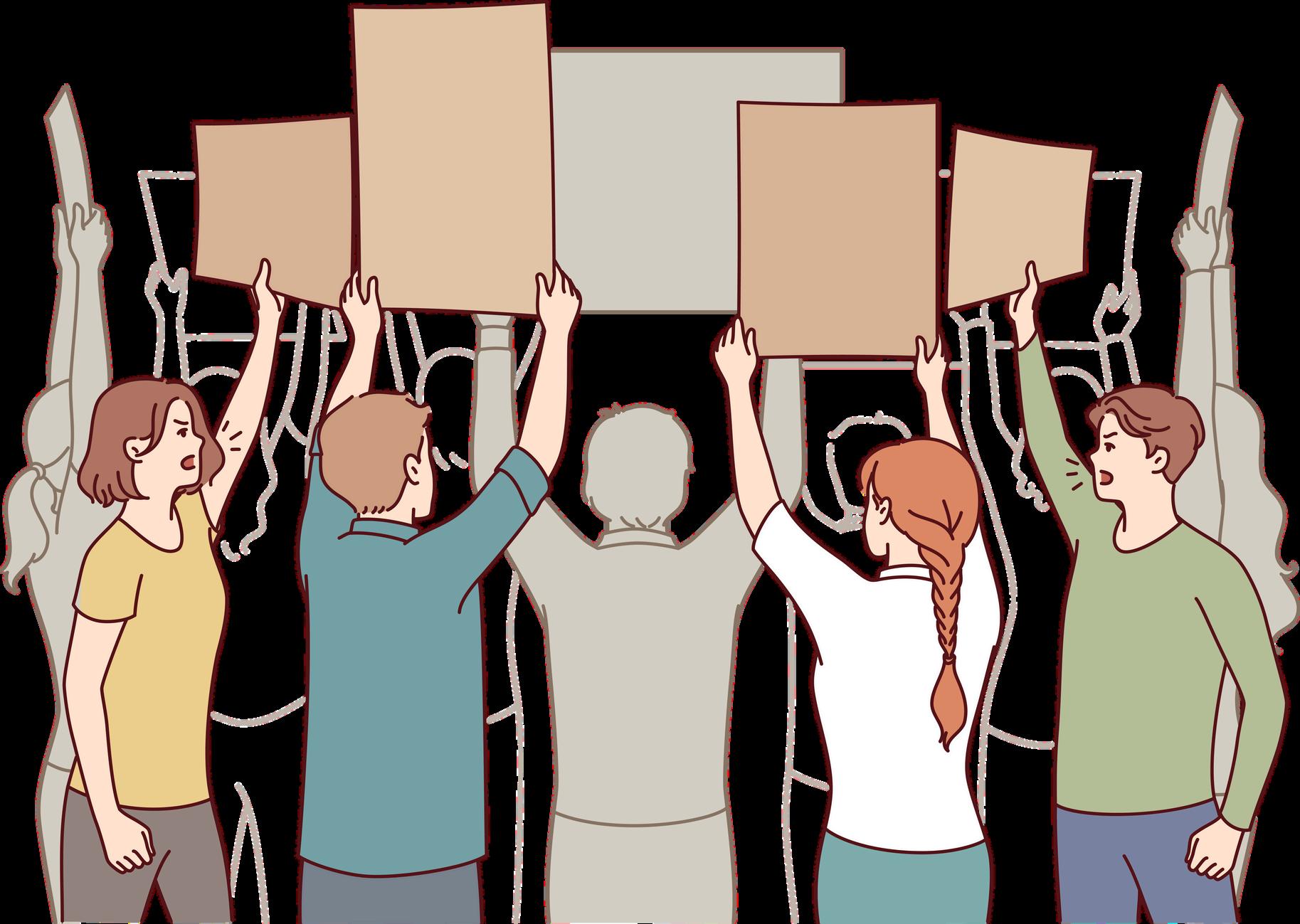
Only 1 in 9 students, of either Bath-based university, are registered to vote in Bath, according to data given to me by Bath and Northeast Somerset Council Whilst this only covers voting registration status at university, that number is still pretty low. Here, I’ll discuss the reasons behind this figure, and make the case that you should register to vote now.
Across the country, voting registration for 1820 year olds sat at around 60%, with the 20-24 age group coming up to 67%, in 2022. This contrasts with the average 88% registered amongst all other age groups – young people are much less likely to be registered to vote than others [1]. Furthermore, this has decreased, with 76% of 18-20-year-olds being registered to vote in 2014, compared to 60% in 2022. To me, the reversal of this trend is imperative; the requirement for photo ID at polling booths has made our civic duty more difficult to carry out [2]. Former government minister, Jacob Rees-Mogg admitted in 2023 that this was a concerted effort to reduce the voice of young people – we are, traditionally, less likely to vote Tory [3]. The mere choice by those in power to make voting harder should inspire us to make extra efforts to ensure they do not succeed Whilst a potentially naïve idealism is already apparent in this article, I am proudly uncynical when discussing voting rights Voting is the most basic and important exercise in our democracy So why aren’t many young people taking part?
One reason for the lack of student voters could be previous government policy After individual voting was introduced, whole households couldn’t be registered by one
BY FINN LAWRENCE-KNIGHT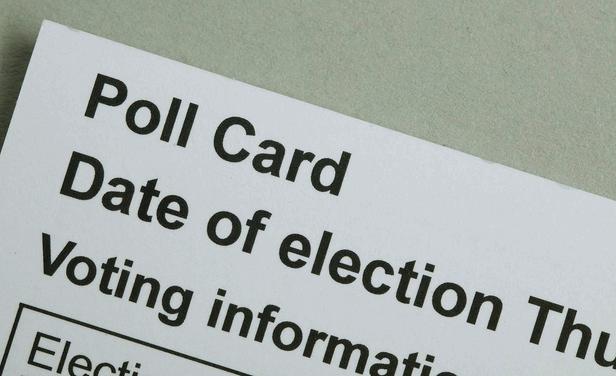
person, nor could universities register all their members automatically. According to The Guardian, levels of student registration in the first weeks of university fell from 100%, to under 10%, in most student residences [4].
I conducted my poll of peers across the UK aged 17-21, on whether, and where they’re registered.
It’s not well-known that students can register both at home and at university – we can vote in both places at local elections, and choose one of the two to vote in at national elections. The results of my research were clear. The majority of respondents were only registered to vote at home or university, with only 37% being registered at both [5]. When this majority was asked why they weren’t registered at both, the largest percentage of respondents said they didn’t know they could be The next largest were the options ‘couldn’t be bothered’ and ‘don’t plan on voting at university’
I have to admit that before researching for this article, I had no idea one could vote in both places at local council or police commissioner elections The lack of education on this topic, both in terms of basic information and inspiration, seems to be the reason for this lack of registration at university and home.
If you ’ re reading this knowing you ’ re not registered to vote, I implore you to. Just search ‘register to vote’ and click on the UK government website. You’ll need your National Insurance number and the address(es) of where you’d like to vote. Even if you vote at home in the General Election, local elections can have a huge impact on your quality of life at university, from potential impacts on prices to crime, local healthcare, and other social services. The next local elections are on the 2nd of May. I understand that voter apathy is high – I often feel that the disconnect between us and our governance is greater than ever. But in a time when our voting access is slowly being restricted, now is a more important time than ever to involve ourselves in the political system. Make yourself represented by voting, reading media, discussing current events with friends and family, and even volunteering for candidates you believe in I’ve put some websites at the bottom of this article to help anyone reading participate in our democracy
"Democracy doesn't work if people stay at home It thrives when every voice is heard, especially those of our youth As students, your engagement in the voting process is not just a privilege but a responsibility By turning out to vote, you ' re shaping your own future, contributing to the vibrancy and strength of our democracy. Each student's vote carries the potential to create positive change, to influence policies that directly impact your education, your community, and your future."
– MP for Bath, Wera Hobhouse.
Voting registration as a topic is, admittedly, not sexy But it’s something I think we should all care about, no matter how it seems on the surface. In a time when those we elect are trying to ‘gerrymander’ the vote, and restrict our ease of voting in the process, there is one thing you should take away from this article. They
Freedom of expression: the cornerstone of democracy, the lifeblood of a vibrant society, the partner of diversity and pluralism. Yet, in the UK, freedom of expression has found itself in limbo at a crossroads, stuck between the challenges in a rising digital landscape, legal threats and evolving societal morals and norms.
Published in 1948 by the United Nations, the Universal Declaration of Human Rights stipulates the rights of human beings across the world, rights which the UK must adhere to. Holding the UK to account when it concerns the freedom of expression, is also the task of the European Convention of Human Rights, effective as of 1953, which reinforces the protection of human rights and political freedoms across Europe. As a result, the UK is subject to the European Court of Justice which may protect British citizen’s rights if restrictions to their freedom of expression are not legally qualified, and together they protect the right to freedom of expression, including expressing opinions that may disturb, offend or shock Going a step further in 1998 with the Human Rights Act, freedom of expression became a codified right in the UK allowing the freedom to hold opinions, receive and impart information and ideas without interference by public authority and regardless of frontiers [1]
So, surely we should be confident that our rights to freedom of expression are respected?
However, confidence in legislation guaranteeing such freedoms seems to be falling. Certainly, this seems to be the case following the recent comment from the international alliance dedicated to strengthening citizen action, Civicus Monitor, that the UK government has become increasingly hostile towards ‘campaigners, charities and other civil society bodies’. [2]
 BY ELLIE WHITWELL
BY ELLIE WHITWELL
To explore whether this decline in confidence was true in my area, I sent out a form to students of the University of Bath in an attempt to understand whether they felt this was a wider societal issue or if they believed their freedom of expression was also challenged within university life. 73% believed that on-campus freedom of expression was respected and a further 66% responded to say that they felt as though freedom of expression was respected more on campus than in wider UK society, suggesting that students at the University of Bath felt more comfortable expressing their personal views within their university bubbles rather than within the wider community
Reasons for this included the belief that younger generations, mostly students at university or in schools are becoming increasingly progressive and more accepting than older generations within society, with younger generations having grown up in a more open and diverse environment, where conversations around supposedly contentious issues are less problematic for the youth who have bypassed more conservative or traditional perspectives. Campus life at university offers a diverse range of opinions and platforms such as the student magazine and multiple societies, where students have the opportunities to find support and voice their opinions freely – this is a system that thrives on ideas.
When asked whether they believed freedom of expression was respected in the UK, the majority of respondents concluded that freedom of expression has become increasingly challenged, feeling that this was due to revisions to existing legislation since 2020 in an attempt to crackdown on protests expressing ideas that did not support the more popular narrative. Others alluded to the new Scottish Hate Crime and Public Order Act, claiming that this may have the potential to generate a polarising effect, limiting the freedom of expression by misunderstanding what freedom of expression actually means
Scotland’s Hate Crime and Public Order Act has created controversy with critics arguing that the law will have a ‘chilling effect on free speech’ [3], where such legal action may cause people to hesitate to exercise a legitimate right (freedom of speech or otherwise) for fear of legal repercussions.
On voice in particular, J.K Rowling has argued that it will create an issue for women supporting gender-critical feminism due to the potential risks of opposition groups silencing those who advocate single-sex spaces, thus restricting the divergence of opinions on a highly polemical matter.
Recent news headlines report that Scottish police have already received over 3000 hate crime complaints since the new law was introduced on Monday 1st April – will this inundation be a drain on our police forces, losing time and money over deciphering what is honest, criminal and legitimate? The law in itself outlines that an offence has been committed if someone communicates material or behaves in a threatening or abusive manner with the intention of “stirring up hatred” based on protected characteristics, including disability, transgender identity, religion and sexual orientation. [4] Yet, the majority of claims towards hate crimes that have been made are said to be less than likely to result in prosecution, suggesting accusations of mere offence are mostly reported – let’s not forget that offending people is not in itself a crime This raises questions as to whether we are beginning to forget or ignore the fact that criticising or offending are valid forms of freedom of expression too This act did indeed clarify that religions may be insulted or ridiculed, a bold implication that offensive comments may still be made as long as they do not consist of threatening and abusive language.
It appears that there is concern regarding how this law will be interpreted. As discussed, the risk of treating this law more trivially seriously becomes a key issue in this ongoing debate,

posing questions as to whether mistakes such as misgendering an individual can be reported under this law and when and where a comment does indeed become a hate crime
There appears to be a fine line that is hard to fully determine, and over time clarity will be needed to specify the vagueness surrounding what is considered hate speech (expressions of hatred) and what is not.
Since 2020 we have seen multiple protests go ahead on our streets, including the 2021 Black Lives Matter movement, Bristol’s Youth Strike for Climate in 2020, and UK with Ukraine in London in 2022 - a strong indication that UK society respects and allows for the freedom of expression.
However, the Conservative government have recently activated legislation which gives the police more powers to shut down protests. In 2022, the Police, Crime, Sentencing and Courts Act was approved, giving police powers to shut down protests over levels of noise, and increasing their power to initiate stop and search protocols. Furthermore, February 2024 saw police powers extended to banning those protesting who are blocking roads as part of their activism [5] These are just two examples in which we can see the UK government attempting to impede a human right
The 2023 pro-Palestinian marches across the UK were labelled as ‘hate marches by the Home Secretary at that time, Suella Braverman, with attempts to stop marches that expressed solidarity with the civilians of Gaza Legally, the police did not have the power to do this, and so, certain individuals within the Conservative Party attempted to undermine the pro-Palestinian marches by attempting to discredit them through the media.
Should bans be allowed to limit one group in favour of another, especially when they are not advocating terrorism, but expressing solidarity with victims?
Further talks are underway among government ministers as to whether MPs should be allowed to engage with protest groups such as the Palestinian Solidarity Campaign, Extinction Rebellion and Just Stop Oil This would be an attempt to move away from hastened comments on ‘mob rule’ that cannot be justified, as stated by human rights groups like Amnesty International, following criticism towards PM Rishi Sunak for exaggerating tensions at protests [6]. Ultimately, framing a narrative in this way undermines causes protesters rightfully are allowed to express their opinions on, criticise or support, undermining their freedom to express themselves, thus chipping away at our democracy.
If MPs are unable to engage respectfully with protesters, it may prove detrimental to those who want to engage in conversation with the government to progress and peacefully help their cause.
Freedom of expression cannot be labelled as respected just because it is simply enshrined in law. It shall be respected when certain individuals with power in the government allow protesters to march without manipulating the context.
It thus remains clear that our rights should not be taken for granted As a Western democracy, UK citizens are privileged with their access to rights that some countries go without, rights that must continually be fought for Certain sectors of society, such as universities may enjoy more freedom of expression, but overall there is rising concern rising that recent government actions could curtail freedom of expression How will the new law in Scotland play out? Will hate speech go as far as silencing unpopular or mildly offensive opinions?
[1]

C C C E E E N N N S S S O O O R R R E E E D D D


It is no secret that news surrounding climate change is beginning to sound like a stuck record, with deadlocked discussions and sluggish strategy implementation becoming routine amongst actors across the globe.
Although watchful eyes remain primarily on the environmental transformation taking place in the earth’s northernmost region, an equally alarming decline in international cooperation in the Arctic seems to be stirring. The Arctic is warming at a rate nearly four times faster than the rest of the world, suffering the consequences of a rapidly changing climate on a much larger scale than its southern counterparts Melting ice and rising sea levels not only threaten the unique ecosystems and native species of the polar region but also put the human rights of its inhabitants at risk
Of the four million people living in the Arctic, approximately 12% belong to indigenous communities, and these groups are most distinctly impacted by global warming. Deeply rooted connections with the icy landscape govern the traditional lifestyles of many indigenous groups, guiding their sustainable hunting, fishing, and farming practices. Their connection with the natural world is inextricably interlinked with centuries of cultural heritage; thus, radical changes in the environment jeopardise the rights to life, health, property, and culture, to name a few
Involving the likes of Canada, Denmark, Russia and the United States alongside various indigenous organisations, the Arctic Council has its work cut out in maintaining cooperative relations in the region
With Norway serving as its current chair, the intergovernmental body has been relatively successful in preserving stable communication among actors in the Arctic. Unsurprisingly, Russia’s invasion of Ukraine in 2022 has landed diplomatic relationships in hot water and challenged the already exceptionally fragile status quo.
Russia’s role in the Arctic Council is essential, to say the least, with the country comfortably taking the top spot as the largest Arctic state not only in terms of area and coastline but also population, including the indigenous population.
Frosty connections between the Russian Federation and other Arctic actors coupled with the changing climate cracks open space for conflict in the region as behind the thawing ice lies what some believe to be unprecedented economic and strategic potential.
With international shipping under pressure, cutting long-distance times by up to 40% is becoming increasingly viable as reduced ice coverage makes the Northern Sea Route (NSR), North-West Passage (NWP) and Transpolar Sea Route (TSR) attractive alternatives to traditional routes
However, with the majority of voyages taking place during the summer months, shipping along northern routes remains seasonal. This, along with blurring territorial lines and murky messages amongst nations on transit regulations, means that passage through the Arctic Circle is becoming all the more contested.
As nautical navigation fuels friction, there is yet another valuable asset in which almost all countries want to stake their claim. Home to abundant reserves of oil, natural gas and minerals such as iron, copper, nickel, zinc and diamonds, the Arctic is a treasure trove of highly lucrative natural resources. Just like with the trading routes, melting ice means better access, but in this case to the seabed, creating a smoother pathway for surveying and, in turn, resource extraction.
While nations squabble to get a slice of the Arctic pie, instability is rearing its ugly head in the region and seems to be showing no signs of a swift departure. It is as though the Arctic is now caught in a matrix-like loop: climate change makes room for exploitation, exploitation accelerates climate change, this makes more room for exploitation, and so the cycle goes on
To add fuel to the fire, although not an Arctic state, in recent times China has proved to be a key player in Arctic engagement with the hopes that, in time, they will be able to claim territory in the area. China maintains that it is a ‘ near Arctic state’ and has been an officially recognised observer of the Arctic Council as of 2013
Playing an extensive role in Arctic affairs, especially through its major investments in arctic economies, but as an observer of the council, the country relies on the support of Arctic states, particularly Russia, to expand influence
Moscow’s newly lenient policies towards Chinese involvement in the region constitute an unprecedented deviation from the traditional routes Russian Arctic diplomacy has taken. Prior to its current arrangement with Beijing, Moscow had long attempted to shelter Arctic affairs from interference by non-Arctic states and openly lobbied against Beijing’s first attempts to join the Arctic Council as a permanent observer.
Moscow only reversed its stance recently, when Russian energy executives pressured Putin’s government to facilitate cooperation with China to prevent Russia’s hydrocarbon exporters from developing an overreliance on shrinking markets in Europe.
With polar ecosystems and communities ultimately bearing the brunt of this slippery international security dilemma, climate policy dialogue is necessary now more than ever to secure sustainable and inclusive policies to protect the future of the Arctic and ensure that it does not simply become a political battlefield on the brink of breakdown

In an era marked by rapid technological advancement and the ever-present depths of social media, the importance of science policy cannot be overstated, particularly in the fight against misinformation For students and young scientists, understanding the intricacies of science policy and its impact on society is not just a matter of academic interest but a vital component of shaping a more informed and equitable future.
The recent Voice of the Future event provided a platform for early career scientists to engage directly with prominent political figures, shedding light on pressing issues at the intersection of science, technology, and public policy. Among the diverse topics discussed, one theme stood out prominently: the challenge of combating misinformation exacerbated by the misuse of artificial intelligence (AI) and social media platforms.
I was inspired to attend the event after seeing the detrimental effects misinformation can have, especially within marginalised communities. As a Biochemistry student and advocate for underrepresented groups in STEM fields, I saw the event as an opportunity to stand up for more inclusive policies and to address the urgent need for clear communication of scientific research in an era of constant misinformation
Questions to the politicians centred on the role of the Parliament in ensuring clear communication of scientific research to the public, thereby preventing speculation and misinformation This question resonated with the broader theme of the event and underscored the critical need for comprehensive strategies to promote scientific literacy and combat misinformation in an increasingly digital landscape.
The panellists' responses highlighted the issue's complexity and the collective effort required from the government, educational institutions, and the scientific community to address it effectively. While their insights were in line with expectations, the emphasis on the challenges posed by AI and social media in disseminating accurate information was particularly enlightening.
Throughout the event, other questions raised by attendees further underscored the importance of science policy in addressing societal challenges, from enhancing diversity and inclusion within STEM fields to addressing the STEM skills gap and promoting public trust in science and medicine. These discussions highlighted the interconnected nature of science, policy, and societal well-being, emphasising the need for proactive and collaborative approaches to tackle emerging challenges.
The event reaffirmed the crucial role of active engagement in science policy discussions for young scientists and engineers It underscored the power of dialogue and collaboration in shaping evidence-based policies that address the needs of diverse communities The event served as a stark reminder of the urgent need to address misinformation and promote scientific literacy in an age dominated by AI and social media. The panellists’ insights shed light on the multifaceted nature of the challenge and the importance of holistic approaches that encompass education, regulation, and public engagement.
In today's landscape, AI stands as both a formidable strength and a potential weakness in science. AI technologies have revolutionised scientific research, enabling unprecedented levels of data analysis, prediction, and discovery.
From accelerating drug development to enhancing climate modelling, AI holds immense promise in advancing scientific knowledge and addressing pressing global challenges. However, the same capabilities that make AI a powerful tool for scientific inquiry also pose significant risks, particularly when it comes to the formation of misinformation.
There has never been a more critical time to prioritise science education and communication. Empowering the public with the knowledge and skills to evaluate scientific information critically is essential for fostering a society that is resilient to misinformation and equipped to make informed decisions. By promoting scientific literacy at all levels of education and fostering open dialogue between scientists, policymakers, and the public, we can build a foundation of trust and understanding essential for addressing the complex challenges of the 21st century Investing in science education is not just a matter of academic interest but a fundamental imperative for safeguarding scientific inquiry's integrity and advancing society's well-being
In conclusion, the Voice of the Future event provided a compelling glimpse into the pivotal role of science policy in navigating the complexities of our rapidly evolving world. As students, young scientists, and members of the public, we must actively engage in policy discussions, advocate for evidence-based solutions, and work collaboratively to build a more informed, equitable, and resilient society. Only through profound efforts can we effectively combat misinformation, harness the potential of emerging technologies, and ensure a brighter future for generations to come.
The misunderstanding and misinformation surrounding HIV/AIDS when it first emerged is well documented and much discussed. This reaction can be compared to the world’s response to COVID. This article asks: how much changed when COVID swept across the world?
Throughout the COVID pandemic, social media became an endless source of unreliable information and fearmongering. Donald Trump’s liberal use of Twitter included rebuking the expert Dr Anthony Fauci’s advice, questioning his expertise, and completely downplaying the danger posed by the virus.

For a president to be at odds with experts brings into question his priorities: the wellbeing of the population or pursuing his personal prerogative? Trump went on to refer to COVID as the ‘Chinese virus’, leading to a spike in anti-Asian tweets and increasing hostility. Where has this been seen before - the targeted attack of a minority group to conceal wider neglect of a virus?
Parallels between the responses to HIV/AIDS and COVID-19 are undeniable. Although the fact stands that AIDS was first detected in gay men (in the USA) and COVID was first reported in China, aimlessly passing the blame and villainising groups does little to conceal the fact that we really cannot trace the source of a disease, despite what conspiracy theorists like to believe
The cultural context adds another dimension to the avidity of the population to choose someone to blame Particularly in America, the suspicion surrounding China rapidly rose after Trump enacted a trade war and began an attack on Chinese media, specifically Huawei. Making them an easy target for Trump to place the blame on for the virus rather than accelerate research and formulate a solution.
Similarly, with HIV, the gay community was already under scrutiny, and the emergence of a disease in the 1980s that only seemed to affect gay people exacerbated this In the UK, the Government had the power and means to sway public opinion but chose not to, putting the gay community at risk and enabling hysteria.
Structural inequalities dictate that those most disadvantaged in a community are the worst affected by the disease. HIV/AIDS was disproportionately present in black communities as well as in Africa, where it remains a constant concern, and hundreds of thousands die every year.
The loss of focus on HIV and the millions that continue to suffer shows how fickle public attention is and how quickly it shifts when the immediate situation seems to be improving
In terms of HIV, the condemnation of the gay community enabled distance and ignorance for most of the population as they felt they were untouchable. This led to a complete misunderstanding and created a huge stigma that still exists today.
Ryan White’s treatment exemplifies this ignorance, as he was barred from attending school upon his diagnosis as he was assumed to be contagious Larry Kramer brought to light the systemic issues in the USA that made drug testing and approval so inefficient, delaying treatment research Dr Fauci is a common thread in these two emergencies, having directed the National Institute of Allergy and Infectious Diseases for both.
The response to COVID-19 in the USA was a combination of Trump pursuing his personal anti-China agenda due to their close competition and the need to shift the focus to avoid too much heat on the government’s back.
Worldwide there was an increase in not only Chinese prejudice but also the antimigrant agenda as a whole. The fear and suffering felt by all were unfairly projected onto migrant workers, making them another group affected by the virus hysteria.
So, did we learn anything from HIV? Though for different reasons, a common enemy was created, and prejudice increased, largely due to unchecked fear and frustration. Populations under pressure often form a mob mentality, and governments do little to calm them because they actively benefit.
Not only is long-term damage caused to an entire community, but it forces a divide when such widespread infections require unity. This divide was clearly present, and the witch-hunting seemed a little different in 2020 than in the 1980s and 90s As Yulin Swen puts it, “We should not be attaching location or ethnicity to diseases”, and this applies to sexual orientations, too

One thing that stayed with me from the latest Oscars (and it wasn’t ‘I’m Just Ken’!) was Jonathan Glazer’s rousing speech on dehumanisation after his film Zone of Interest won the award for Best International Film. Speaking on the present atrocities taking place in Gaza and Israel, Glazer remarked, ‘’Whether the victims of October the 7th in Israel or the ongoing attack on Gaza, all are victims of this dehumanisation. How do we resist?’’ These words (alongside the Zone of Interest itself) sparked an interesting concept among myself and those around me How do we deploy our ethics to the world around us? How might we frame certain groups as being worthy or not worthy of the most basic rights? And how do we find the courage to carry the baton of daily life in the knowledge that the most callous suffering is occurring simultaneously?
If we look back through history, one method that has been utilised time and time again might be seen as putting life through a lens, clarifying it as either sacred or profane. In the past, we used this lens to justify the subjugation of natives during the slave trade and to sacrifice soldiers to their deaths in times of war. In the present, this dehumanisation has enabled the bombing of innocent civilians in the Middle East for the sake of geopolitical objectives, the exploitation of Third World nations to the engine of Western consumerism, as well as the billions of animals that die as a result of the industrialised meat industry. Repeatedly, we minimise the means of these lives to justify our convenient ends.

Disturbingly, our implied Western consent to these injustices can only be conceived in what is a notion of Western exceptionalism, a colonial remnant that discriminates between our enclosed group and outsiders, viewing our group as more sacred and deserving of greater rights The more we minimise the existence of these others to a generalisation and a splodge on our news page, the less they mirror ourselves, and our ability to empathise with them on the most basic level goes out the window. It is then that we allow the darkest of atrocities to begin.
When we consider these forms of exceptionalism applied to the dynamic of different groups, what can we then say if we apply the concept of exceptionalism on a species-wide level? More precisely, how does the way we relate ourselves to our human ancestors shape our present interactions with the ‘others’ of our fellow Homo Sapiens?
This was a quest brought about by Rebecca Wragg Sykes in her book Kindred: Neanderthal: Life, Love, Death, and Art (2020) to illustrate Neanderthals as ’not dullard losers on a withered branch of the family tree, but enormously adaptable and even successful ancient relatives’ In what can be considered a culmination of knowledge on our enigmatic relatives, Sykes intends to look at ‘not only of other ways to be human, but new eyes to see ourselves’.
The last Neanderthal walked the earth, as present estimations suggest, around 40,000 years ago. They are simultaneously our closest living relatives, yet also find themselves across the bridge species-wise as fundamentally different. Upon the discovery of the first Neanderthal skeleton in 1856, scientists dismissed this species as being as representing a more primitive stage of humanity, a species more likely resembling that of a Chimpanzee or a Gorilla in comparison to Homo Sapiens.
As waves of scientific discovery rolled on by, more evidence, merely brushstrokes at a time, eventually has painted a far more vivid picture, to the extent that Sykes references the Neanderthal as our ‘Kindred’, a species capable of complex linguistic abilities and social relationships, of innovative survival strategies; capable of profound art and a persevering cultural identity This is also not to mention that they have bigger brains than us Sapiens, had been around colder climates far longer than even we have now, as well as DNA evidence that they interbred with both Homo Sapiens and our more easterly comrades, the Denisovans
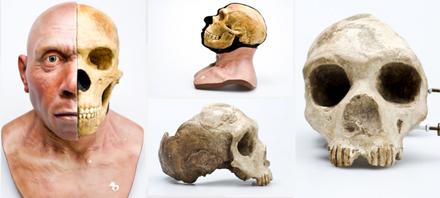
Paleontological findings have shone like a spotlight on the brilliance of Neanderthals, uncovering what was far more than a primitive figure bellowing ‘UGG!’ but a species sharing so many similarities with us To suggest that they have grown into our shadow or mirror would be an imprecise metaphor as many of us contain a proportion of Neanderthal DNA; they are both a part of the fingers typing this article and your brain absorbing the information!
The more that science has uncovered about our ‘Kindred’ Neanderthals, the greater reduced our perceived Homo Sapiens exceptionalism has become, to the extent that we can see modern humans as a product of both Neanderthals and Sapiens. To a similar extent, a lack of knowledge, or even ignorance, could be considered the foundation of forms of exceptionalism in today’s world. Studies show a building of prejudiced attitudes in areas of less ethnic diversity. Perceived superiority is built from mythology rather than real experience. Moreover, as research has further shown that Neanderthals live in the DNA of modern humans, we can further see all groups as existing within a symmetry; we all need to live, love and have autonomy over our lives; fundamental similarities between all of us, bleached away from our minds during conflict and division when we are only reminded of our differences
Perhaps it predicates our perceived intellectual advancement over the millenniums as a myth if Homo Sapiens and Neanderthals found a way to congregate and we are not? But it is only really when we challenge this sickening us vs them pathology head-on that we understand how disturbing this is.
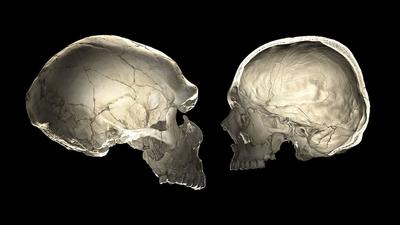

Ncuti Gatwa is a Rwandan-Scottish actor shot to fame as Eric Effiong in the Netflix series Sex Education. While his portrayal of a queer teenager was compellingly heartfelt and effortlessly funny, it simultaneously subverted the ‘ gay best friend’ trope. Having earned universal acclaim with his iconic one-liners on Sex Education (and subsequently having been nominated for three BAFTA Television awards), Gatwa was also cast as one of the many ‘Kens’ in Greta Gerwig’s Barbie, released in the summer of last year In just a few years, Gatwa has gone from a virtually unknown actor to a household name.
In 2022, the BBC announced that he would play the fifteenth incarnation of the Doctor [1]. Alongside showrunner Russell T. Davies (who was Doctor Who’s head writer between 2005 and 2010), it is hoped that the pair can restore the show’s quality that took a significant nosedive during Jodie Whittaker’s time as the Thirteenth Doctor.
Russell T. Davies [2] was undoubtedly responsible for Doctor Who’s popularity in the noughties During his five years as showrunner, he consolidated David Tennant’s role as the fan-favourite incarnation of the Doctor and extended the show’s reach outside of its cult following of

sci-fi fans. Davies’ return as head writer coincides with the show’s new deal with Disney+, meaning that the American streaming service is now the distributor for international audiences. While there are concerns that the show’s reputation as a British institution will be tarnished by this deal with Disney+ [3], Gatwa’s era will certainly be defined by a bigger budget and an even larger overseas audience. This increased budget was immediately apparent in the 60th Anniversary Specials that aired in November last year. David Tennant’s return as the Fourteenth Doctor was accompanied by impressive special effects and ambitious storylines (a contrast to the endearing homemade monsters that were fundamental to the Doctor Who episodes that I vividly remember from my childhood) thanks to the “leap in budget” [2] that Disney+ has facilitated.
Additionally, the 60th Anniversary marked Gatwa’s first appearance as the Doctor While his arrival was arguably overshadowed by Tennant’s nostalgic turn as the Fourteenth Doctor and the decision to have both actors roam the screen as their respective incarnations of the Doctor in the final episode of the three specials, the Christmas special was indisputably a showcase for Gatwa’s charismatic portrayal of the beloved Time Lord. There is something incredibly unique yet familiarly ‘the Doctor’ about Ncuti Gatwa’s iteration that sets him up for a successful reboot of the iconic show.
Firstly, Gatwa is the first Black man to play the role of the Doctor Apart from Jodie Whittaker as the Thirteenth Doctor (the first woman to take the lead in the sci-fi series), Doctor Who has been historically consistent in its casting of white men as the enigmatic Time Lord For this reason, Gatwa (whose
family are Rwandan refugees who moved to Edinburgh in 1995) was surprised when he was selected to “front something that is basically the heart of the BBC” [4]. Therefore, Ncuti Gatwa has insisted [5] that the newest incarnation of the Doctor will be “beautifully Black” and that the British Black community will be integral to the new series
The prominence of the Fifteenth Doctor’s queerness is also a refreshing take on the Doctor’s ordinarily rigid gender identity and sexuality In a recent interview [6], Gatwa spoke about the way that the show connects with queer audiences, particularly as a result of the theme of “chosen family” and the representation of the Doctor as “ a lonely wanderer” that resonates with queer people Perhaps it is this uncharacteristic break with tradition, as well as Gatwa’s acute awareness of what matters to the most loyal of viewers, that will cement Ncuti Gatwa as the face of a new and exciting era of Doctor Who

[1] Belam, M , 2022 Doctor Who: Ncuti Gatwa to replace Jodie Whittaker, BBC announces The Guardian
[2] Seddon, D and Cook, R , 2023 Russell T Davies talks Doctor Who’s ‘defining difference’ now to reboot Digital Spy
[3] O’Brien, S , 2022 What does the Disney Plus deal really mean for Doctor Who? Radio Times
[4] Hahn, D G , Jeff, 2023 Ncuti Gatwa Rising British GQ
[5] Iftikhar, A , 2023 Ncuti Gatwa’s Doctor confirmed to be queer in Doctor Who Christmas episode PinkNews | Latest lesbian, gay, bi and trans news | LGBTQ+ news
[6] Verhoeven, P F , 2023 Ncuti Gatwa: ‘I know many a gay man who’s exactly like the Doctor’ The Guardian
A lot of music is shit. In 10,000 years of civilisation, we ’ ve evolved far enough to develop scientific marvels that operate further than any of our minds can fully comprehend. And yet, we still didn’t manage to evolve far enough to stop ‘ rapper ’ Lil Dicky enter the music charts with his quite literally global 2019 charity single Earth
With 12 semitones, over a million words in the English dictionary, and an infinite possibility of different rhythms at their disposal, the scope for musicians to create songs is limitless However, in this sea of opportunity, some people can make music that even the most respected of reviewers, such as Anthony Fantano, can agree is somewhat good. Whilst others such as NME manage to see the positive in what feels like every album (as just last month they managed to review a whopping 22 albums in a row and give every single one a score of 4/5, except for one being given 5 stars), many are very discerning about what music should be classified as good Despite this, there are a handful of albums that many people and reviewers can typically agree on as being legendary, or at least of being better than the rest There is a certain set of credentials that can separate the Beerbongs and Bentleys from The Beatles (The White Album). Although many may have their own opinions they are all wrong, and my say in the matter is the only one which is correct. This is what makes an album legendary
The closing medley on Abbey Road’s BSide. The raw and constant energy from Is This It?.
The insane vocal performance from Adele’s 19 The scope of conceptuality on Kendrick Lamar’s To Pimp a Butterfly (TPAB). No matter what it is, all of these albums have something unique going for them: they’re all the first to do something in a different way and to that level of execution. Although others (or even themselves) before may have done something similar, none had been as confident and defined as the ones that we would call legendary masterpieces Others after may take inspiration from the originals (and at times even improve on them), not being the first to do it always

holds them back from being respected as reverentially as the original Take DAMN –a great album, it even won a Pulitzer prize. Yet do people consider it to be as legendary as Kendrick’s previous effort? Absolutely not. The shock of TPAB as a piece of art is still being felt in the music world to this day
Whilst some may disagree, having a good album cover is critical for your album to become hailed as a cultural touchstone. Pink Floyd wouldn’t be anywhere near their present relevancy still if it wasn’t for the visionary excellence of Storm Thorgerson creating some of the most iconic album covers of all time. Without that visual stimulus, it’s very hard to relate to the project being presented to your ears. I’m sure Donda may have been a great album, but without an image on the cover, it made it much harder to relate to the music being made. If you can’t put it comfortably on a T-shirt, the cover just isn’t quite good enough. Images last through time: if you want people to remember your album 50 years into the future, you ’ ve got to give them a picture that’s worth remembering 50 years into the future. If you want some inspiration on how not to create a good album cover, feel free to read through Billboard’s list of the 100 greatest album covers of all time. The single worst list ever made.
And this goes without saying. Music needs to be fresh and exciting. You need to break free from that 4-chord prison and develop something that people don’t know they want to hear It needs to be fresh and well
produced. The songs have to have meaning and a meaning you care about. The instruments should sound good, and the melodies should be memorable Listenable as Ed Sheeran is, he’s never going to write a three-movement song such as Bohemian Rhapsody any time this decade. Music needs to break the status quo. There are limitless possibilities for the songs you can make If you ’ re not exploring the field of opportunity, no one is going to remember what you ’ ve put out twenty years into the future. It needs to be emotional and exciting. And you shouldn’t be making the music only to fulfil a record contract
So next time you ’ re planning on making a legendary album, just consult this article and you’ll be golden. But please do not ever recreate John Lennon’s The Wedding Album. Think about it a little.

Likemanyofyou,Iamsure,Iamcurrently planning a European summer trip I’ve foundithelpfultodrawontheinternational experiencesofmyflatmates,soIthoughtit might be nice to share with you, dear readers, my knowledge of my own “gezzelig” home, The Netherlands, in the hopethatitmaytemptafewofyoubeyond Amsterdam’s “coffee shops” and the Keukenhoftulipfields.
While Amsterdam is the typical destination for most students on their first trip to the Netherlands, many visitors often miss out on the “authentic” Dutch experience by leaving out local gems from their itinerary. The Netherlands has a wonderfully connected transport system, so you could easilytravelfromTheHaguetoGroningen in3hours,whichispracticallythelengthof the entire country! So why not take advantage of that on your trip and explore moreofwhatthecountryhastooffer?
When visiting the Netherlands be sure to considernotonlybigcitieslikeAmsterdam, Rotterdam and Utrecht, but also save some time during your stay to visit the smaller, lesser-known cities such as Leiden, MaastrichtorGroningen.
Located in the south of the country, Maastricht is a beautiful and quaint university town with a lovely social atmosphere You will easily find bars or cafes in which to enjoy a nice meal. Maastricht rests between Germany and Belgiuminthesouthofthecountryandhas much history in connection to these two countries Ifscenicwalksareyourcupoftea don’t miss out on Vrijthof Square, Saint Servtius Basilica and “Sint Jan” or Saint John’sChurch.
If you ’ re more interested in experiencing theauthenticDutchatmosphere,besureto check out Leiden on your way to The HagueorRotterdam.Thiscityisverysmall andyoucouldeasilywalkaroundtheentire centreinaday,but,thisdoesnotdiminish its charm As you get lost in the cobbled streets, you’ll be sure to notice all of the unique aspects of Dutch architecture (and I’mnotjusttalkingabouttheunforgettable windmill in the town centre). Also be sure totakeastrollalongthepicturesquecanals of Leiden, especially the Rapenburg Canal. Finally, check out Leiden’s “hofjes” which date back to the 17th century. These are smallcourtyards,atypicalDutchlandmark.

If you ’ re headed up north towards Denmark, please make some time to stop by Groningen on your way. This wonderful city has much to offer and reminds me of Bath in many ways. It is also a university town and has many charming cafes and restaurants as well as a lively nightlife
scene Itischeaperthanlargetouristycities such as Amsterdam and offers a mix of quintessential Dutch architecture and modernbuildings.
Now,ifyou’reinterestedinvisitingabeach city in the Netherlands, be sure to visit Scheveningen and its conjoined sister, The Hague. Surprisingly, Scheveningen is adored by kitesurfers and windsurfers for itsstrongwindsandlargewaves.Thereare many surf clubs, despite the Netherlands’ (unjustified) reputation for being cold and wet. If you ’ re in the city during spring and summer also check out the “strand-cafés” built on the sand of Scheveningen beach. Most of these are only open in the warm months and they offer great coffee with a beautiful view. The Hague also has many museums and other tourist attractions to offer.Butitismyhometown,soImaybea little biased in its favour Be sure to rent rowing boats at the Westbroekpark, and also enjoy a scenic tour of The Hague during your stay. If you came to the Netherlands to visit the Keukenhof and weredisappointedinthelargecrowds,then there is a small hidden gem in The Hague, which may make up for your disappointment. It is the Japanese Garden, hiddenawayinClingendaelPark.
Before I leave you, let me give you my recommendation on the best time of year to visit the Netherlands (but still enjoy the weather).Surprise,surprise,Aprilwouldbe mybestbet.Aprilisnotonlytulipseasonin the Netherlands, allowing you to enjoy the beautifulfieldsandburstsofcolourthatthe tulipsthatKeukenhofhavetooffer,butyou can also enjoy “Koningsdag” on the 27th of April. “Koningsdag” is a yearly tradition which celebrates the birthday of Willem Alexander,theKingoftheNetherlands Itis widely regarded to be the best day of the year,therearefestivitieswhereveryouare
in the country, games in the streets, yard sales everywhere for knick-knacks and wearing the colour orange is almost essential!

Last remark, if you happen to be in ScheveningenonNewYear’sDaybesureto take part in “Nieuwjaarsduik”. At noon on New Year’s Day, over 10,000 people run into the North Sea to celebrate the New Year. After the swim, you can enjoy a hot bowl of soup and the iconic UNOX hat to flauntyourachievementfortherestofthe winter months! I did it this year and can confirm it was one of the best Dutch traditions I’ve ever been a part of. The energy at the beach between the typical Dutch rave music blasting over the speakers, and the nervous energy of over 10,000 people around you committing to the same goal is electrifying. I have officially been converted to take a cold plunge in the Sea every year and wholeheartedly encourage you to take part in it yourself Over the years, 60 other coastal cities in the Netherlands have integratedthistradition;Englandshouldbe takingnotes!
The after-show week is always strange. Getting decent sleep and catching up with studies feels healthy but it’s also a little lonely, and every now and then a snippet of a line will flash before my mind, a physical segment, a silly joke from rehearsals. Am I offloading post-show blues on some poor unsuspecting readers… yes. Is it satisfying? (no comment)
My friend Archie and I co-wrote a play called “The Life Machine” together and directed it for BUST (Bath University Student Theatre) at the very end of February earlier this year From start to end it was a big part of our lives and at times, it felt all-consuming. But, throughout the year, plunging time into the project gave me an amazing sense of release, no matter how chaotic things felt around me I think that’s something really special about writing and it’s why I think anyone can and should give some form of writing a go!
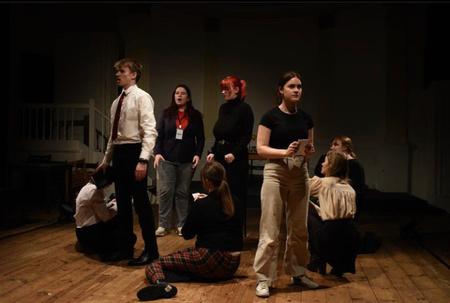
I can recall vividly the moment Archie suggested we write and direct a show together It was in the celebrations after our Fringe performances last year in the inky darkness of the Royal Crescent, lit poorly by the streetlamps and amid the ambient sounds of tipsy shouting from elsewhere on the lawn A few months later, I’m sitting at the foot of my bed, messaging him an absent-minded shower thought and then he’s responding with a rich tapestry of characters, plot, betrayals, corruption, and some very funny quips Most of the play was written that summer when it was an exhilarating break from the joys of work. We kept it a secret from our other friends in BUST. In some ways, I think we didn’t dare to dream that our pitch for it would get chosen
It was magical when it did, perhaps it’s how mother birds feel when they see their chicks learning to fly (well, successfully, that is). Then there was a moment of inertia when we realised duh duh duuuh! that we had to attempt to finish the script, find a producer, think of some ideas for publicity, and remember why we wrote the thing in the first place! I would love to know (and simultaneously quake to know) how much time we put towards the Life Machine. Talk about a play with an AI that takes over the main character’s life this play was taking over ours! I guess they say to write what you know…
I hope that the memory that sticks with me is the view from the balcony in the Mission Theatre after the very first night of the show. That was the first moment since the summer when I felt I could finally let go of this chapter, just a little. Our star-studded
cast mingled with their audience like a firework settling in space We’re so grateful that they let two blokes with a whimsical sense of humour tell them what to say.
Writing has this incredible ability to transport you into a world of your own making At its basic level, it is free therapy because it allows you to be a spectator and to achieve some perspective on your life and the world. I’ll leave you with some of my favourite questions that inspire me to write: Is there a common problem facing you/those around you and what works/doesn’t work when dealing with it?
How does it feel to be you, living now, having had your experience of the world?
What characters occupy the world around you? How do the people you know tell their own stories?
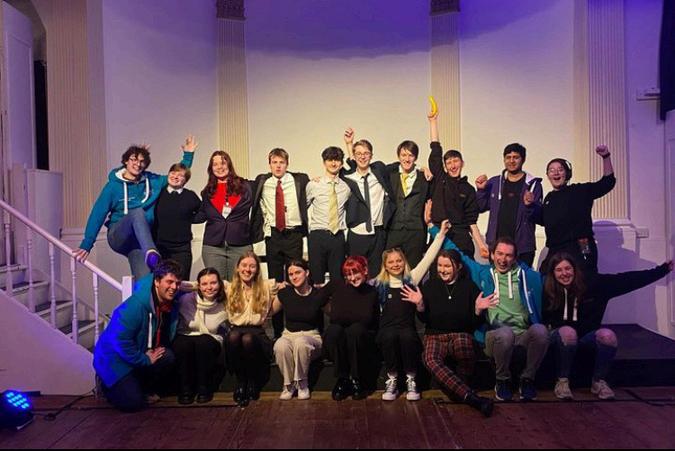
It’s sometimes hard to tell what makes music good and what makes music bad. Thankfully, we mere civilians don’t need to worry about our sweet, innocent little minds trying to work that out for ourselves. We have access to the legendary beacon of musical perfection which is the Annual GRAMMY® Awards. We no longer need we worry about what songs we ’ re allowed to listen to or what songs released in the last 12 months are finally deemed worth our time These industry monoliths of excellence compile every year what can only be described as the most holistic, exclusive, and legendary list of the best songs and albums that are absolutely 100% correct and perfect and without any flaw or lack of merit in the slightest, every single time.
I often struggle to decide if the music I’m listening to is the best in its field. I’ll spend a couple of minutes or even hours like a clueless blindfolded deafened bat scrolling through Spotify’s new releases, recommended taste profiles, and top charts to look for something that I think I’ll like. Then, I remember what a complete and total utter idiot I’m being None of these songs have been hand-picked to be the greatest of the year by the Recording Academy, the greatest collection of music reviewers on the planet! The Annual GRAMMY® Awards literally exist just so that I don’t have to worry about any of that! Instead, I head over to the official annual GRAMMY® AWARDS® website to see what records and tracks are worthy of the mythical price that is the ANNUAL
GRAMMY®®® Awards. One album that I stumbled upon, which is naturally worthy of its place in the Annual GRAMMY® Awards’ catalogue of nominees is Post Malone’s Beerbongs & Bentleys. And boy, am I so grateful that I didn’t make the mistake of looking it up on any other review sites. Typically, the fact that I had to scroll to the 12th page of Metacritics’ best albums of 2018 to find this album listed at 1113th for that year alone, only 10 places away from being the lowest-rated record of that entire year, listed among other critically hailed albums such as 6ix9ine’s Dummy Boy, Lil Xan’s Total Xanarchy and William Shatner’s very own Shatner Claus: The Christmas Album, would put me off a bit. But thank goodness I didn’t look there, as the Recording Academy’s ®GRAMMY®
®Awards® decided it was for sure in the top 8 for this year, and I would have missed out on game-changing lyrics such as “Got a big bag with a Bape on it (Bape on)”, and “We got alcohol, plus bad bitches, that’s lit (that’s lit, that’s lit)”.
Whilst we ’ ve been sitting longingly in our semi-detached, beige-painted homes waiting for February to come around every year, the Recording Academy have been hard at work behind our backs for the last 50 years listening to Capital Radio and Spotify’s Hot Hits playlist to narrow down the long list of music that’s been released to a finite handful of tracks. Back at the beginning of the 70s when Abbey Road was nominated for album of the year, did its flawless 10/10 or equivalent rating across at least 10 of the most highly respected critical reviewer’s publications affect the Annual G®R®A®M®M®Y® A®W®A®R®D®S®’ decision? Did the fact that it would go on to grace the top 10 of almost every top album of the all-time list since its release change their opinion on it being album of the year? They would never be swayed by such irrelevant metrics The classic cultural touchstone that is Blood, Sweat and Tears’ eponymous sophomore album made it to the top. Thank goodness we ’ ve all heard about it and seen it on a t-shirt since that year, because why would the academy choose an almost entirely obsolete album whose long-term relevance has been so weak that Wikipedia could only find two professional ratings, list it on its official page? They just wouldn’t. Obviously.
They’re also great at spotting up-andcoming talent. Which is phenomenal from them, and I’m truly grateful that when I want to find out about musicians really
putting their heart and soul into their music, so that an official body can recognise these small artists like Billie Eilish, who only had a minuscule 5 million monthly listeners when she won literally every single GRAMMY®®®® AWARD for that year. One may have thought that at least one other person created something worthwhile, but much to our glee the ®®®®®® Awards could see through everyone else’s bullshit and only give the awards to Billie, the one true deserver of all awards everywhere.
Thank you GRAMMY.

All the lights around were circles of wonder, Impinging their rays on her tear-filled eyes
But they hurt her head and she looked away.
Feverish, and slightly shivering, she tried to be composed
But that overburdened, tired, timid little soul was a bundle of nerves
Half her head screamed for her to get out of that wretched bed,
The other just didn't dare to face the day. Anhedonic, she prayed
For strength, for that lump of rock in her chest to disintegrate
However, it was the world that paled away Carrying no charm anymore.
She could observe the river of time but didn't feel like dipping her toes in it
Calendars were a farce and so was the clock. Sunset or sundown was the same -
One blob of unreachable golden bliss
That came in through the cracks of the blind
To steal a kiss and journey it's way to another week
She had lists Of commitments and deadlines
That she incessantly went through in her brain
Sadness gushed out - blood-like Anxiety launched its ugly rear head
And yet again she realised that she was trapped in her own body.
In the beginning, she fought for another chance
Thought she could still make it to the other side, unscathed
But now she found herself at the end of the pack
Stuck in a marathon where the finish line kept getting out of reach, shifting further. The future felt daunting and the present a prison.
She felt she was beyond saving.
BYMEGANJOHNSTONE
The wondrous creatures following close behind,
It is my metaphor for her unique sense of being.
How it can be intriguing sometimes to be broken, It’s something magical that makes you question if it’s even real But it’s also ugly and truthful as you’ll feel her pain as much as she does. At least some part of it, You’ll never truly and deeply feel her pain Or her ecstatic happiness.
mom is her EVERYTHING
She’s so empty and cynical that in her head she’s already lost everything Every tragedy has already presented itself and funnelled its way into her heart.
She thinks that she’ll only be missed for a second once she’s gone.
That’s if she’s missed at all as she’ll never believe that anyone other than her mom (and maybe me) actually loves her. Her dad loves her but not as much as he would’ve if she were truly his.
The family could never really love her. She’s too much like her dad.
And I will only ever love her.
She gave me no other choice.
You strolled through the door with the wondrous creatures following close behind. With a nod and a quick soul screeching stare you make your way to that maroon chair that only your presence can fully embrace. Shoes on and hands neatly folded the buzzing silence is filled with the whining kettle that always seems to boil just as you walk in I'm not sure I ever turn it on though Before I can get your tea I'm kept in place with a flick of your buzzing finger.
No time for small conversations it seems, for a moment the noise falters as the tear lands on your bitten nail still hovering as if not sure whether it can return to your rested hand nails digging into your palm wishing they weren't so short. You drop your head as the buzzing shatters another of my favourite glasses and I know this time you won't stay to clean it up. Sitting there in the shattered silence I helplessly hand you a cotton cloth. You were so ecstatic when you found them at that market we went to years ago You said it reminded you of your mum as if you ' ve already lost her but I guess to you in a sense you ' ve already lost everything. As my headache reaches that screeching all-time high you slowly rise with them flying around as if they're the ones pulling you up until you ' re floating above this city like a lost balloon.
Some kid will only miss for a second. You hug me at the door and somehow I wish you never did
How am I supposed to let go of your fragile body when I know it'll collapse when it's not leaning against mine but you made me promise that if this day were to ever come I have to let you go. We know nothing I say can make you stay anyway. In the darkly lit street I can see their flicker as if it's meant to be a celebration, but as your silhouette grew smaller so did their light I think. Moments before, the buzzing seemed to fade into something resembling a melody that could only be described as happiness and pure contentedness But then it all quieted down as the calm settles over us and somehow it felt like I could hear your last breath as it lingered around that maroon chair I will now have to throw out But will we mourn those beautiful creatures or will we live in serenity knowing your pain has finally ended.
BYLOUISESADLER
In yellow, in black, in ultraviolet waves; a ringing swarms the darkness, a damnation tormenting. What transforms the skin in twisting fits, turning, red notches entwined in nature’s venom, induces cause to fill in the lifeless figure, altering the hero
The bees are buzzing, in spirit, in mind, in body. Purity is ripped through, cast aside by faint footprints of the hostile ultimatum, the feigning of innocence. How deceiving, how unjust, in that of the wasps ’ sting, for significance casts the virtue on the angels’ side, the serpent ridiculed and disregarded; a wasp taken by its demons, lashing out gentle honey workers---They are waiting, pausing for brief surrender.

Snow. It drips from fingertips and lingers on, into the cold of the day. It frosts on the deserted surfaces on which we walk. It freezes the vast expanse of water that filled the dip of the valley when the rains came
Her. In the moonlight, shadow, silvery and incandescent, she stretches out along the translucent tiles of the ice palace, the place of worship for those frozen in time
It is she, the regent of ice, of Death.
Like the unexpected visitor she was and forever will be, an unwelcome sorrow sweeping through barren lands and ashen sands, the remnants of all those of the Dead, the unwelcome visitor of Life in the land of Death. At the edge of living, she resembles a ghostly figure, sweeping back her glinting hair – a curtain of ice – to reveal the place of the lifeless Her true self bathes in the shadow of the mountainous ice palace, a hill of feigned freedom, of doom, of darkness – the prison for lost souls of the Heavens.
Looking out over the veiled canopy, a face saw her and won't forget that memory - it is pinned to their mind, etched in stone, they can't escape - it is a hooking of the mind, a silent scream in the shadows of the Living. This is surely a step too far into the land of Death, as this queen, regal and imposing on her throne of woe, stirs, locking eyes with the Intruder A man, plump with signs of life, of a beating heart
All that's left now is the snow, covering the Death, covering her.
It was sent by those above to punish us and the world. It came from a rumble in the sky and fell like the angels did, the stars of the sky, the Fallen. The crows of clouds soar toward the impending storm. It is dark, both grisly and grimy, ready to pounce on the innocents in the world of Life The Intruder made it so His grasp for knowledge stole innocents away from the light
–You did this. You did this to me.
The ice palace was struck. It sent waves of shock down its rocky turrets and sent the glassy icicles spiralling to the pit – an endless void full of Oblivion. It turned against the silence of Death and shocked the palace to the core Again, waves of glass splinters rolled down to Oblivion and took all they could with them, in their panic clasping for holds on the solid, slippery surface.
A tremor of laughter was audible in the surroundings of this catalytic slide Vengeance from ahigh had arrived, perfectly on time, the Heavens reign supreme.
The queen, wakened from her stupor, rose up awkwardly, her feet gripping the frosted floor, in an attempt to brace against the landslide towards the void
The face turns from its canopy, unable to watch the event, unable to call out, to help. The land of Life and Death are separated, always close but never, ever touching The race of the snow, the rocks and the ice had begun towards Oblivion, all that could be done was to look away. The Intruder looked away.
The ice palace gave in, grumbled its final breath, and let go of its precious coverings, becoming the bare hill it once was, powerless.
Her icy fingertips still drip in the pit, next to the Fallen. The death of the trees and their drooping branches are only signs of the ice palace’s ruin.
She stills. Breathes the snow. In and out.
Her life yet to live was not to be lived but told and imagined - short like her visit to the pit, betrayed by the Intruder for playing on her innocence, her youth
For this no real queen. This was one innocent girl taken by a gruesome fate, pulled to the prison of Death, out of the utopia of Life Her mistake? Trust Love
It will be the end of her time, but the beginning of others, as the ice palace will come again, transforming from a mountain to the snow it was before A trick of the Heavens perhaps, a Corruption by blind obedience of a cause that leads Living souls to the prison of ice, a palace that traps the best of us, wrapped up in the guise of the regent, but, in truth, where Corruption may feed off innocent souls, deposited at the hand of the Intruder, so that the Heavens may be nourished and rise again – the supposed safe haven for the land of Life.
As I enter my final few months of being a student-athlete at the University of Bath, I have found myself looking back at my time here and reflecting on the past four years. This journey really has taken me on some amazing adventures, but it has also given me some tough moments Although everyone I talk to seems to take a sharp intake of breath when I tell them I am studying for an undergraduate politics degree and am a Modern Pentathlete, I have loved being able to do both at the same time
A combination of running, swimming, riding, laser-shooting and fencing, Modern Pentathlon may seem like a very eclectic grouping of sports, but it originated from skills a cavalry officer needed to have [1] and has evolved many times to become the sport as we now know it. Modern Pentathlon has been included in the Summer Olympics since 1912 [2], and last year, the World Championships were hosted right here at this university. Having competed in the women ’ s relay event, it really was something to have such a supportive, home crowd behind me - not something I have experienced before, and to come away with 5th place was a testament to my teammate's and my motivation as well as that feeling of a large crowd behind us, supporting us to the finish line
Modern pentathlon can be quite a demanding sport: training for five disciplines alongside an intensive gym
program, rehab and stretching does take its toll when coupled with a university degree There are definitely times when my life seems chaotic, with deadlines looming and a full competition schedule in front of me. But, learning to use all of my resources wisely has helped me navigate this
So, what does daily life look like as a student-athlete?
I would love to say that my routine is similar day to day or even week to week, but that would be a gross generalisation With changing university demands and training schedules, it does complicate matters. Generally, the pentathlon squad trains every day apart from Sunday, which is a complete rest day We train for just over 20 hours a week, with targeted tougher days and some easier recovery days. Our competition season begins around March and lasts through the summer. There are also many single-phase competitions that we attend to gain experience, especially for fencing.
Each period of the year has its own unique challenges. Winter provides the base of our training and often requires long, grinding sessions, clashing with the due dates of my assignments in the first semester of university Then comes the exam and deadlines period in January, which often requires me to back off slightly in my training to concentrate on these. As competition season warms up with the weather, semester two of university begins Despite the increased number of international competitions, I have found that working during flights is particularly productive - there really is nothing else to do!
In balancing university and pentathlon, I must confess I have been pretty lucky with my faculty and also the support I have been given over the past few years. The PoLIS department has been such a big help with everything, from my tutor to my lecturers and my head of department, although I can’t sugarcoat how stressful it can become when everything is due all in one period. It’s all just a big balancing act - training, studying, socialising - one big game of work and play.
I have been able to travel and see some amazing places like Cairo, Budapest and Barcelona, and immersing myself in the local culture can be difficult when competing, as you tend to only see the inside of a sports venue. That said, visiting the Pyramids of Giza in Egypt, the Hungarian Parliament Building in Budapest as well as La Sagrada Familia in Barcelona have been key highlights during my travels, so I’m not doing too badly on that front.
Although my university experience may have been a little different from some of my friends, I feel as though it has given me a great skill of balancing my life and taught me that if you work hard at almost anything you can get results Would I change it? Not at all!
[1] Jonathon Hogeback, Britannica, 2016
[2] UIPM- The Greek Olympic Games Pentathlon
TWO INSPIRATIONAL ARTICLES TELLING YOU ALL ABOUT THE HIGHS AND LOWS OF MARATHON RUNNING, BOTH AS PARTICIPATOR AND OBSERVER...
The 42nd Bath Half Marathon took place on Sunday 17th March, with runners assembling in Royal Victoria Park ready and raring to embrace the challenge.
With warmups underway, the atmosphere was exhilarating and many charity tents welcomed those who were running for them while families made their way to the edges of the start line with a colourful abundance of banners supporting their loved ones.
For some, this was their first half marathon (including myself), for others, the challenge was less daunting as they had completed
many of these races before. Yet, the most incredible element was those of all ages coming together to accomplish such an achievement.
The route consisted of two laps, beginning at Royal Avenue, down Newbridge Road and over the River Avon. The runners then looped back on themselves down Lower Bristol Road, making their way up, then down Pulteney Road. After a slog along Upper Bristol Road, they began their second lap Water zones for the runners could be found along the way as well as children handing out sweets - well-needed energy boosts!
There was a well-prepared medical team
present around the course allowing runners to feel safe - if needed, help would be there.
The clock struck 10:20 and the first wave of runners hit the ground running From this moment, the adrenaline buzzed along with the runners, and the crowds pressing in on each side of the track could feel the excitement One hour and four minutes later, Omar Ahmed was crowned winner out of a total of 8443 runners. At 11:34 Becky Briggs became the first woman to cross the finish line, becoming a two-time Bath Half female winner.
Many students from the University of Bath participated in the event, including Sports Management student Lily Norton: "The Bath Half was an incredible experience for me, the training leading up to it was hard but I have now found a love for running. I was running for a charity very close to my heart and one that has really helped my family so having them there on the day was very special The atmosphere was incredible, with continuous support along the way from spectators, it really helped in those tough moments. It was such a brilliant thing to do, and doing it with my best friend was amazing, we both got surprising finish times which we are both proud of I will definitely be doing this event again."
As a participator myself, completing this challenge with one of my friends most definitely encouraged my motivation throughout the training period. Sunny days were easier than the miserable ones and sometimes the short runs were the most challenging. However, once I had reached my longest final run at 18km, I felt self-
assured that completing the run on race day would most definitely be within my reach.
My running experience before the Half Marathon was substantial, however I had never run above 13km. Many I spoke to on race day had never even run before they began training for the Bath Half, so I’d encourage anyone to pick up a pair of trainers and give it a go!
The race ended on Royal Avenue with a steep and daunting climb to reach the finish line Finishing times ranged from 1 hour 4 minutes to 3 hours 52 minutes, with the crowds applauding all who passed. Giddy on the runner ' s high, each proud participant went on to receive their welldeserved medals and finisher t-shirts
If you ' re looking for a scenic route, then perhaps Bath Half isn't the one for you. Whilst the route was easy to follow, some of the highlights in and around Bath don't jump out to you on this run. It may even take you by surprise that this race does not have pacers along the way, but helpful staff, two large water stations and a clearly laid out route with an organised training village consisting of ample luggage space, changing facilities and group warm-ups make the Bath Half Marathon an event that any runner should be confident in attendingthere is a constant 'feel-good' vibe that was by-far a key part of the whole experience! If you prefer predictability and reassurance on your running route, even better!
If you love to give back to the community, the Bath Half has a plethora of charities
working with it including Alzheimer’s Society, Macmillan, Bath Cats and Dogs Home, and Bath Rugby Foundation. Alzheimer’s Society has raised over £1.1 million from this event over the last 15 years - running races with charities really does make a difference [1].
Feeling motivated to attempt the Bath Half?
Bath Half 2025 entries are now open! (Early Bird Price just £50!)
See you there!
[1] Bathhalf.co.uk, 2024
On Sunday the 17th of March, over 8,000 runners took to the streets of Bath to complete the 42nd Bath Half Marathon. The run, which started up the year after the first London Marathon, consisted of a fast and flat 13.1-mile race around the city. Starting at Royal Avenue, it takes runners west along Upper Bristol Road and Newbridge Road, before turning back east onto Lower Bristol Road, past the train station, and onto Pulteney Road. Here, they turn around and head back into the city centre, where they do nearly another loop, but just cut it short to finish back at Royal Avenue [1]. The ‘largest charity fundraising event in the South West region’ [2]
attracts everyone from the elite to the amateurs, with Matthew Mbithi and Liz Yelling holding the course records at 61:44 and 69.27 respectively [3].
Having done the Great South Run back in October, I knew how nerve-wracking it can be, and so I was eager to support my friends who were taking part. As soon as I left my house, I could feel the buzzing atmosphere that encapsulated the city It was as if there was a magnetic force dragging people towards the start line. The air of excitement encompassed friend groups and families alike, a sense of anticipation so strong you couldn’t shake it off The road closures exacerbated this feeling, and before I knew it I was on the race course, waiting for my friends to speed by. First came the elite who hurtled by, impressing everyone on the sidelines The spectators, adorned with babies, dogs, and motivational signs, started to fill up the roads to watch this spectacle and soon after this, the first wave came into view, and with it, cheers and hugs from their supporters. Then came the green and orange waves subsequently Encouragement appeared never-ending, lighting up the runners ’ faces and giving them that extra push. Watching everyone come together to support the runners on their journey to raise money for causes close to their hearts gave me a warm, happy feeling.
The race from a participator’s perspective is – no surprise - much more of a challenge I collected insights from four runners to see how this year ’ s Bath Half challenged them:
A means to push yourself…
Inspirations for this race were personal and varied. Answers ranged from being inspired by seeing people run the race last year, wanting to raise money for a charity that means a lot to them, to being a means to see how running can affect athletic performance. However, the overarching inspiration was using the race as a challenge to push themselves physically and mentally, allowing them to gain the most from the experience.
Most people stick to just running as their training, however, this can be boring and can put a lot of strain on your body. Hence, there is an emphasis on incorporating other forms of exercise such as CrossFit and swimming into the training plan, which massively helps fitness levels, alleviates the stress that running puts on your body, and makes training more interesting. If you find your plan boring or too physically demanding, you may end up ditching it (as one person did!), highlighting the importance of finding a training plan that works for you.
Your emotions will be all over the place during the race. Nervousness at the start turns into feelings of happiness thanks to the amazing, buzzing atmosphere As the race goes on, you might encounter several challenges. The loops are a hard mental barrier to overcome, the lack of hydration stations and a lack of crowd towards the end may diminish your morale When you think you ’ re done, the uphill finish takes it out of you. When crossing the finish line
there’s an immense sense of relief. Seeing your support system at the end of such a gruelling race is hugely rewarding and being presented with medals by school children makes it that much more speciala whole community is supporting each other. Runner’s high engulfs everyone.
Your mind controls everything:
You’re tougher than you realise and if you can train your mind, you will gain perseverance and overcome challenges you may not have thought you could have. The discipline and resilience that you learn will enhance all areas of your life Runner’s high is addictive and it’ll make you want to run another Half Marathon!
If this article has left you inspired, then sign-ups for the Bath Half 2025 are already open …
[1] Bath Half, 2024b Course
[2] Holburne, 2019
[3] Bath Half, 2024a. Elite & Best for Age Entries
It’s the run-up to the 2032 Brisbane Summer Olympics and a new winner has been announced in the 100m sprint… for theParis2024Olympicsallthoseyearsago The previous victor of 2024 has just had theirmedalrevokedduetodoping...
As anticipation grows for the upcoming Olympics in Paris this year, there is growing scepticism around the validity of victors, who may lose their titles 4, 8 or 12 yearsfromnow[1].SincetheLondon2012 Olympics, 42 medal holders have been caught doping and had their titles revoked [2]
The current situation of drug use (doping) in sports shares commonalities with the comic book ‘Asterix and Obelix: At the Olympic Games’. Asterix’s superhuman, performance-enhancingdrugsarestolenby the Romans, resulting in a Roman victory However, Asterix does not take the ‘magic potion’, reflecting the values of the Olympicsregardingsportingintegrity.The Roman victory was short-lived as the potion was laced with a blue dye, which is revealed on the tongues of those who cheated. Following this detection, the Romans are disqualified and the moral of the story is reinforced: play fairly across sports However, this quick and easy catch is much more difficult in the real world of doping.
Doping is the use of stimulant substances to improve sporting performance Varied drugs are being used to enhance performance, the most common being anabolic steroids [3]. Steroid use can be detected through blood testing whereas other forms of doping prove more challenging to detect, for example, blood transfusions, where blood is removed and re-injected to boost oxygen levels. The cyclist Lance Armstrong adopted this method to win seven Tour-de-France titles – he was only caught after admitting to doping [4]. The substances are so wellmanufactured and tactically used that they can pass as undetectable. Current detection relies on biological markers tracked by athletes in biological passports
However, what if drugs were not banned from the Olympics? This is what D’Souza, President of the ‘Enhanced Games’, is proposing The Enhanced Games are an iteration of the Olympics but without drug testing. Rather than having the World AntiDoping Association (WADA) attempt to play the cat-and-mouse game of keeping up with doping advancements and drug prevention, there would be an alternative system to prevent cheating, i.e. no system.
Despite this idea being contradictory to the values of fair play and integrity in competitive sports, it has indeed gained popularity and media coverage, bolstered with backing from several Olympians, such as Brett Fraser (Olympic swimmer) [5].
Maybe the popularity of this idea comes from a need to level the playing field, based on the likelihood that many athletes who use drugs are going undetected. A systematic review found that the prevalence of doping within elite sports is likely to be ‘underestimated’ due to the challenge of detecting drugs[6]. Already ahead of the 2024 Summer Olympics, there have been disqualifications; Dominic Lokolong Atiol of the Refugee Olympic Team has tested positive for doping [7]. If athletes are looking for an edge, like the Romans in ‘Asterix and Obelix’, where else to get it from other than these magic potions?
However, finding blue tongues is not as easy as one would think. The methods of doping at Olympic level are highly sophisticated and operate not just at an individual-athlete level but structurally This was the case with the Russian doping scandal – drug use in sports was systemic [8]. Contaminated drug samples were exchanged through small holes carved in the walls State-sponsored doping was rife[9]. Perhaps the clearest limitation of the anti-doping system is that WADA did not catch on - the whole situation was revealed by a whistleblower Such a scandal reflected the real challenge for WADA: it is not solely the athlete to blame for doping, for it can be a collective effort of the team, the coach and, in Russia’s case, the state.
Dealing with doping is a necessity for the image of sport in society, as, for many people, professional athletes are role models, an image to look up to or even revere[10]. Already, the implications of doping are seeping through into nonprofessional sports activities and into leisure In 2023, 183 reports were made regarding enhanced performance through drug use – this was a jump from 62 cases in 2022. Even within non-competitive sports, people aiming to reach fitness goals are susceptible to doping 75% of male gymgoers have reportedly admitted to taking steroids. These steroids and other forms of doping pose serious health risks to those taking them, and users aren't always aware of these dangers, not to mention potential addiction. This reinforces how the Enhanced Games cannot effectively deal with the implications of doping for the public. Instead, the idea perpetuates the normalisation of doping and cheating in society, skirting the serious social alongside health repercussions of doping.
This message was a key teaching from the fictional world of Asterix and Obelix – but such fiction needs to be reiterated as a reality and have its presence felt in the sporting industry. Doping is cheating. Effectively, it is like completing the Bath Half on a Voi
[1]Longman, J , 2024
[2]Este, J., 2024
[3]Bird, S R et al , 2016
[4]Carroll, R , 2013
[5]Bloom, B , 2023
[6]De Hon et al. 2015
[7]Kelsall, C 2024
[8]Wallace, A & Giambalvo, E , 2022
[9]Ingle, S , 2016
[10]Lynch, S., Adair, D. and Jonson, P., 2016

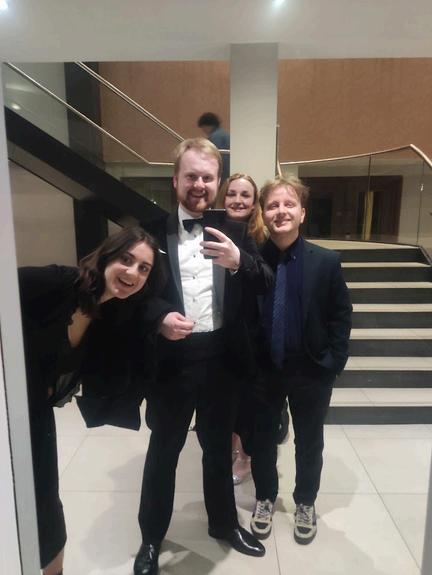
LU, JESS + PETER (OUR MEDIA HEAD) AT #SPANC2024!!!
As the weather becomes warmer and it becomes harder to find a seat in the library as the exam deadlines creep closer, it is that time of the year when we at Bath Time must say goodbye to the current committee, and welcome the new students stepping into their roles. I want to not only congratulate the current committee on their achievements this past year but also thank them for creating such a strong team to lead Bath Time in September As Co-Editor next year, I am eager to continue increasing Bath Time’s contributor base, providing students with a platform to share their views and develop their journalistic skills through publishing fair and accurate content I am excited to see what the future holds for the incoming 2024 committee and how Bath Time will develop over the next few months.
‘’Frequently, I catch myself reminiscing about my 18-year-old self, dropped off at university for the first time. Did he predict himself to become Editor of the uni magazine? In his wildest dreams!
It has been a privilege to be Editor of Bath Time this year. I like to think I have left a lasting, positive legacy on the magazine which I hold so dearly to my heart. Whether it’s interviewing my favourite band, Squid, for our Underwater series, being shortlisted for the National Student Journalism Awards, or simply getting to meet so many people passionate about news and writing, this has been a year I will never forget. I can’t wait to see where our biggest committee ever (!!!) will take Bath Time next year I hope this isn’t goodbye... even if it may say so!’’
Co-Editor-in-Chief 2024-25: Nina Carter
“I am really excited to be stepping up as Co-Editor and my focus for the year will be making Bath Time much more widely read by students and making it the ‘go-to’ place to find out what’s happening on campus. I have lots of ideas for how we can develop the magazine and bring in the wider student community to help create articles that you want to read I am really looking forward to having such a strong team with me next year who are all as eager as I am to breathe a new life into Bath Time.”
Co-Editor-in-Chief 2024-25: Lili Illman
”This past year has been a journey of discovery as I delved into the world of journalism and helped set up the Science and Innovation section. As I look forward to the challenges and opportunities that the role of Co-Editor-in-Chief will bring, I am eager to continue fostering a culture of creativity, collaboration and accessibility within our publication. Together with my fellow editors and contributors, I am excited to elevate the standard of our newspaper, amplify diverse voices and continue to make a positive impact as well as, and most importantly, having fun. In Bath Time there really is a place for everyone ”
Deputy Editor 2024-25: Katie Head
“I am looking forward to working with our new committee to grow the magazine and getting to read all of the brilliant submissions from our journalists. I can’t wait to be inspired by our contributors and support them in bringing out the best of Bath Time ”
Comment and Conversation Lead 202324: Louise Sadler
“Having first entered the Media Hub in September 2023 as a media rookie, the girl I was back in May 2023 who had not written at Bath Time previously, has taken her job in her stride, taking on not one, but two roles as an attempt to fill in the gaps of a very small three-man team. Comment and Conversation has certainly grabbed the attention of many feisty contributors wanting to express their viewpoints and this has been a learning curve for me in supporting my contributors while providing critical analysis through constructive dialogue I have really enjoyed expanding my knowledge base on a wealth of topics and sparking important discussions. Juggling my time was certainly a challenge, but this experience has been enriching, from MoggOff to One Young World, I will cherish these memories as a writer and editor, not to mention the never-ending stream of articles!”
Comment and Conversation Lead 202425: Naz Gogus
“Having been involved in Bath Time since arriving at uni, it has been an amazing experience and I am excited to be a section lead for the upcoming year I am looking forward to the opportunity to collaborate with our committee and contributors across the university to explore new ideas and bring fresh perspectives to our readers I will work hard to develop a wider and stronger Bath Time community by establishing regular meet-ups for contributors, fostering a space for idea sharing and bridging the gap with our student body so we can make Bath Time a place for everyone. ”
‘’This is a role that I took up halfway through this year, when the former Features and Investigative Lead told me, after putting no effort into his role in Bath Time, “If you care so much about this investigation then you do it!”. Thankfully he isn’t a part of our magazine anymore.
I have written for every section of Bath Time, however, this is the section in which I have to say my work has made the greatest impact on the community around me. Whether it was my mass survey of students, asking them what they believed the key issues in our university were in the run-up to our SU Elections, the investigation that I did holding the university account for cutting its bursary and scholarship funding for students, or even my article on AI and Journalism that got me nominated for a National Student Journalism Award.
Each of these is on subject matters far from disclosed, and I hope they keep their legacy, referred back to a few years back as the start of remarkable change, a ripple in the campus pond... rather than a mere plop!
A few months ago, Eva approached me about what role she should apply for as part of next year ’ s committee Having known her from her work across student media, I knew she was witty and ambitious with heaps of initiative; qualities that make a perfect Feature and Investigations Lead I look forward to reading her work next year ”
Features and Investigations Lead 2024-25: Eva Wigham
“Although I have many ideas of my own about stories to follow up on, I believe this part of the publication to be one of the most important in voicing student concerns and standing up for student issues. I will do my best to make myself known to you all on campus and be an active member of our student community. So, never feel too shy to come say hello! You’ll soon see that I won’t bite - only into the stories you would like me to, anyhow.”
Lifestyle and The Splash Lead 2023-24: Jessica Lawrence
“This year as Lifestyle and The Splash section lead has been full of fun and surprises As a third-year chemical engineering student, I must admit that balancing my role within Bath Time with impending deadlines was challenging at times but I wouldn’t change it for the world! I am forever impressed by the passion and creativity each contributor has shown to the magazine this academic year. They are truly the essence of Bath Time and the magazine would not be anything without their dedication. Their willingness to share their stories, insights and expertise has enriched our magazine and our community. I am forever grateful for this experience and as I step down from my role, I will forever treasure the memories we have shared. I am very thankful to Bath Time for having introduced me to such lovely people and giving me the chance to collaborate on wonderful projects together (it is a nice breath of fresh air from my usual uni work). My favourite part of this role remains creating the print editions together and making our whimsical ideas come to life. I am confident that the legacy we have built together will endure, inspiring future generations of writers, editors, designers and leaders and I for one cannot wait to see what is next in stock for the magazine ”
Lifestyle Lead 2024-25: Aanchal Chawla
“I am excited to make Bath Time a space where everyone finds their own corner to read, write and relate to. I’m looking forward to introducing more fashionrelated articles and integrating student culture further.”
Splash Lead 2024-25: Megan Johnstone
“I want to get more people involved as our current group does not have a lot of creative writers. I look forward to working with those who are also passionate about writing and I believe we can do something great with Bath Time next year. ”
Sports and Activities Lead 2023-24: Louise Sadler
“As Sports and Activities Lead, developing this section of the magazine from its initial ghostly form to one of the most active teams within student media was a whirlwind – my pride and joy! Developing the standard of student media coverage of university sports has been a huge triumph of mine. I kickstarted new initiatives, including a reporting and commentating network with sports societies to celebrate the success of teams and help aspiring journalists develop skills in match reporting. I have enjoyed liaising with URB and Campus TV to develop media-wide projects, such as the podcast, ‘Pathway to the Podium’, and a documentary following the University of Bath Women’s First Team in football Improving my technological skills and making contacts with the sporting community has enhanced my college experience through building a strong team and advocating for greater awareness of sports teams that aren’t as well documented I look forward to seeing where Bath Time goes next year with an eager and creative new team!”
Sports and Activities Lead 2024-25: Kevin
Ciobanu“I can’t wait to continue celebrating our sporting successes next year! Not only do I want to provide students passionate about sports journalism with more opportunities to report on our athletes, but I also look forward to fascinating investigations and personal stories about their sports and activities in Bath and closer to home - introducing everyone to their local teams and favourite activities back home.”
Our new committee positions for 202425...
Science and Innovation Lead 2024-25: Ellie Insley
“I am passionate about journalism and excited to be Bath Time’s first-ever Lead for the Science and Innovation section I am currently on my Year Abroad, but am looking forward to returning to campus and seeing how this new section develops and the exciting stories we are going to cover ”
Head of Design and Digital 2024-25: Amy Joy
“As Head of Design and Digital, I am most looking forward to revamping our social media strategy as well as introducing more content in interview format. I’m very excited to get as much varied Bath Time content out as possible and push for more inter-society collaboration!”
Head of Podcast 2024-25: Adam Wright
“I’m really excited to be running the podcasting at Bath Time next year. We’ve got some big plans and if you ’ re at all interested in working on or making podcasts please get in touch.”
Social Media Lead 2024-25: Emma Leach
“Next year I’m most looking forward to getting involved in the university’s media scene by creating compelling content and experimenting with new ideas to engage and expand our audience. As I’m going to be focused on the social media side, I plan to grow Bath Time’s online presence to increase our impact within the student community!”

